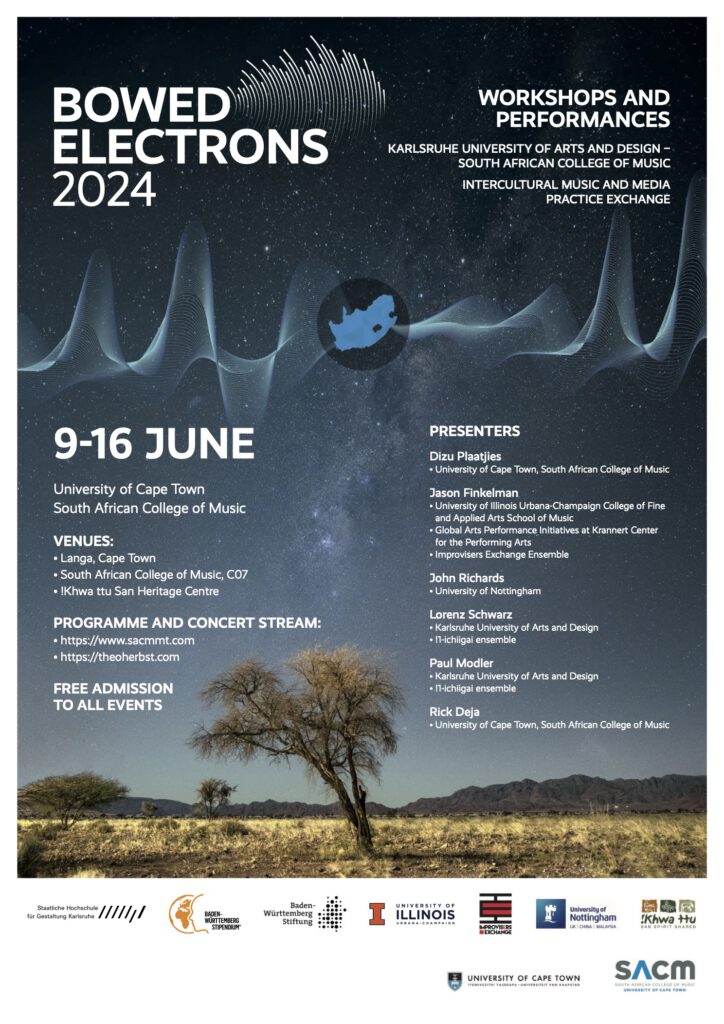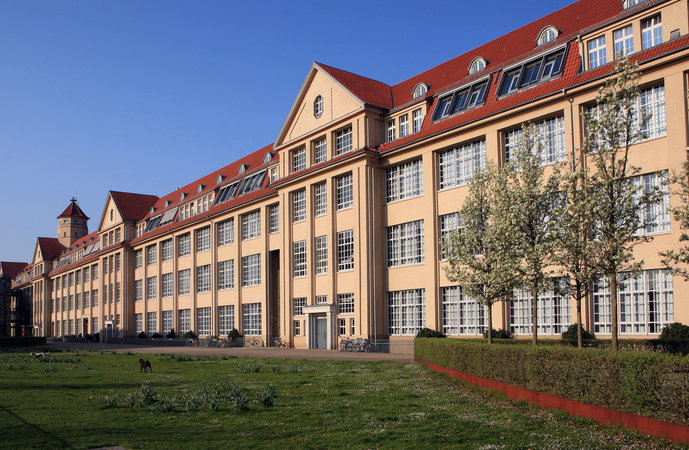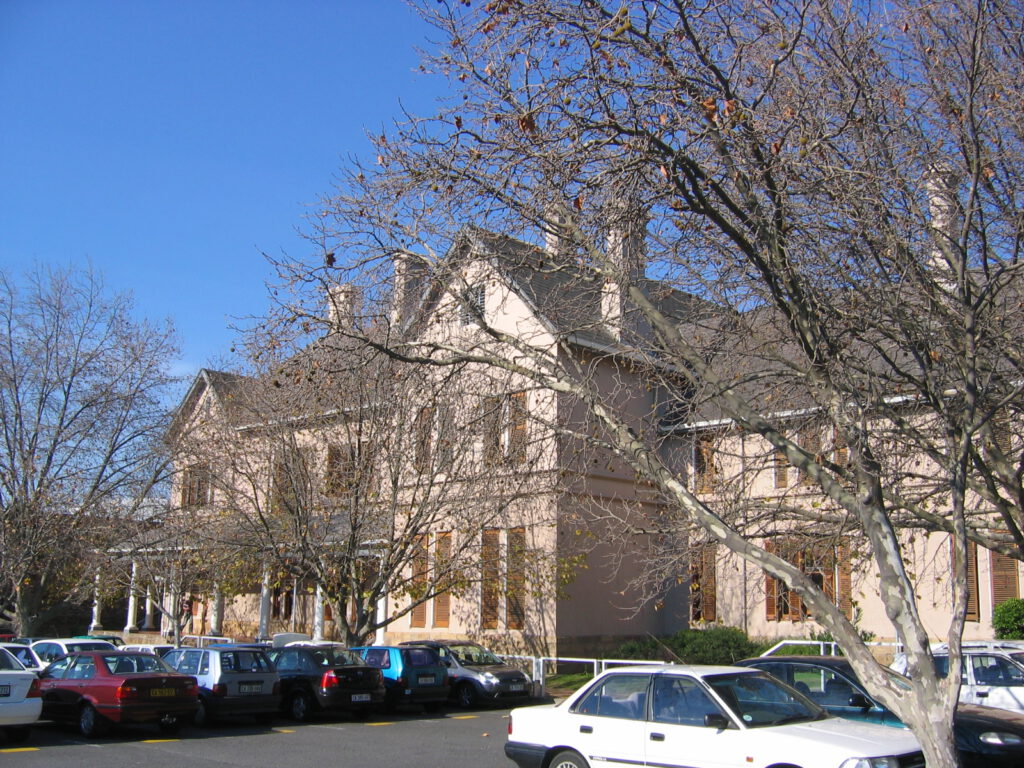Interkulturelle Medien- und Musikpraxis
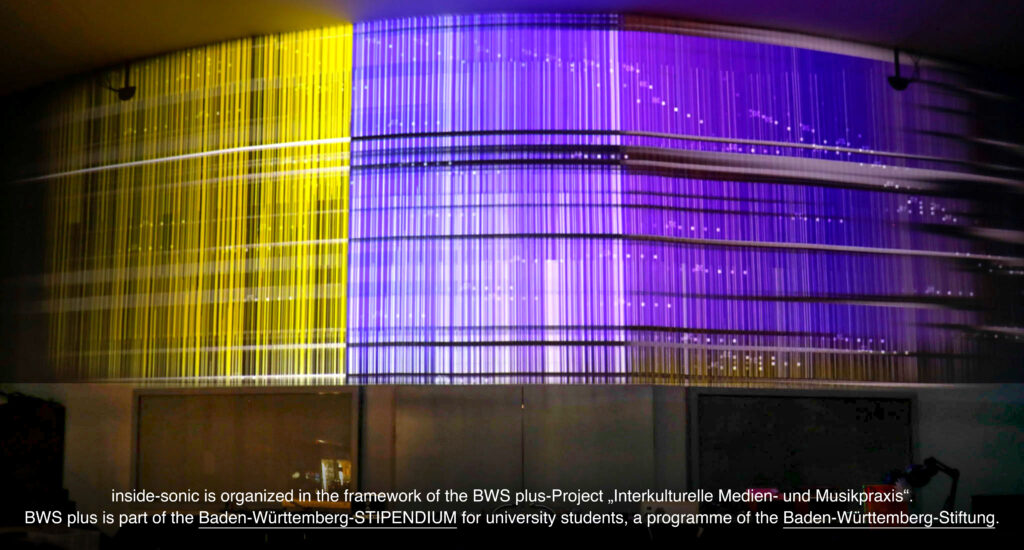

Intercultural Media and Music Practice
2025
Workshop | Circuitry-Based Sound | Nov. 24th-27th
Part of the Intercultural Media and Music Practice (inside-sonic.de)
In collaboration with Bowed Electrons and SAE Institute Cape Town
“Circuitry-Based Sound” is a transdisciplinary workshop focusing on DIY electronics and group performance. It introduces participants to self-built circuits as a simple and direct way of creating custom-made electronic music and programmable microcontrollers with sensors to create augmented and extended instruments.
The workshop combines hands-on experimentation with conceptual discussion. Participants will explore breadboarding, circuit hacking, and sound generation through simple electronic systems. Alongside the practical work, we will reflect on topics such as the relationship between tradition and technology, material, and artistic process.
Participants will design and build their own small-scale electronic sound devices and develop them into performative setups. The workshop concludes with a collective live presentation of the works created during the process.
No prior experience with electronics is required. All materials will be provided.
Venue:
SAE Institute Cape Town
6th Floor, De Waterkant Centre
9 Somerset Road, Greenpoint
Cape Town, SA, 8001
Dates: November 24 to 28, 2025
Times: Daily from 10:00 to 16:00 (Monday to Thursday workshop sessions, Friday final presentation)
Contact: lschwarz@hfg-karlsruhe.de
Registration:
If you would like to participate in the workshop Circuitry-Based Sound, please register by sending a short confirmation email to lschwarz@hfg-karlsruhe.de
No formal application is required. A simple message that you would like to join is enough.
The workshop takes place from Monday to Thursday, with a final show on Friday where we will present the results of the workshop in a group performance. Each day runs from 10:00 to 16:00 at the SAE Institute Cape Town.
There will be regular breaks, time for informal music rehearsals, and of course biscuits and tea. If you have any further questions, you are very welcome to contact Lorenz via lschwarz@hfg-karlsruhe.de
Beyond Culture – Inside Sonic (Symposium Concert) | Nov. 28th-30th | SAE Institute Cape Town / Karlsruhe
Beyond Culture – Inside Sonic addresses collaborative and non-hierarchical approaches to aesthetic, musical, and artistic research about and through sound and sound-oriented music.
The event explores practices of non-instrumental music making and production from various perspectives including archaic, classical, electric, and synthesizer-based traditions, as well as electroacoustic, digital, and algorithmic approaches.
A central focus will be the use of improvisational strategies to enable the creative emergence of collaborative experimentation and aesthetic research within a shared music-making environment.
Streaming: https://url.za.m.mimecastprotect.com/s/WcbTCwjyBrSLDq96DIVfXCJyWGC
Alternative streaming is provided on the URL of Bowed Electron: https://www.theoherbst.com/
Preliminary Programm
Friday Nov. 28th | |
09:00 | Ari Sitas (keynote) |
10:00 | Yannik Thamm & Eric Wehner |
11:00 | Thabisa Dinga |
Sam Njoroge | |
12:00 | Bonga Mosola 15min |
13:00 | Lunch Hour Concert |
Thabisa Dinga, Bonga Mosola, Yannik Thamm, Eric Wehner, Samuel Njoroge | |
IMMP workshop presentation/concert performance Circuitry Base Sound & ichiigai | |
14:00 | Cameron Harris |
15:00 | William Fourie |
Daouda Dao | |
16:00 | Emaeyak Sylvanus |
Kulanen Ikyo | |
17:00 | Roundtable discussion |
William Fourie (chair), Daouda Dao, Brian Bamanya – Afrorack, Moses Watatua, Denise Onen, Günther Lübbert | |
18:00 | Meryl van Noie |
19:00 | Evening Concert |
HFG Inside Sonic Beyond Culture IMMP | |
Miles Warrington & Abrahan Mennen, Meryl van Noie, Mathew Pratt |
Saturday Nov. 29th | |
10:00 | Lucy Strauss |
11:00 | Matlali Matabane |
John Richards | |
12:00 | Cara Stacey, Adam Mirza and Akiva Zamcheck |
13:00 | Lunch Hour Concert |
Dizu Plaatjies and Simpiwhe Mathole and Cara Stacey, Adam Mirza, Akiva Zamcheck, Pierre-Henri Wicomb | |
14:00 | Miles Warrington&Abrahan Mennen, Dimitri Vouduris |
| 15:00 | Roundtable discussion |
| Paul Modler (chair), David Tinning, Lorenz Schwarz, (Theo Herbst), Bonga Mosoloa, Denise Onen, Eric Wehner, Thabisa Dinga |
16:00 | Richard Foss |
Günther Lübbert and/or students | |
17:00 | Roundtable discussion |
Richard Foss (chair), Günther Lübbert and students, Paul Modler, Markus Noisternig, Lorenz Schwarz, Denise Onen | |
18:00 | Leigh Landy (Keynote) |
19:00 | Evening Concert |
Leigh Landy, John Richards, Lucy Strauss, Dimitri Voudouris, Günther Lübbert, Matali Matabane, Cameron Harris |
Sunday Nov. 30th | |
12:00 | Roundtable discussion |
Prof. Sitas (chair) „Music in these hard times“ | |
13:00 | Lunch hour concert |
Ari Sitas Universal Race Congress composers‘ workshop |
2024
BOWED ELECTRONS | 9-16th June 2024 | University of Cape Town
BE is hosted by the music technology section of the South African College of Music, one of the departments of the University of Cape Town. As such, BE is one of five ‘pilot projects’ nurtured by the music technology section. BE is an initiative devoted to the exploration of sound, including the subset ‘music’. It has, over the course of the last few years, obviously attempted to negotiate for itself a foothold in the vibrant South African cultural landscape. At first glance, the fact that this process has been guided by ambitions to secure a place on the cultural fringe, appears counterintuitive. The reward, however, is found in diverse, varied and probing programme content, accommodating and framing a range of contemporary composition currents in a process that culminates in an archived educational toolset. The fact that BE can exist alongside “popular” musicking and the “classical” investment in tradition must be attributed to three factors. Firstly, a group of loyal participants have committed time and energy yearly, resolutely. A technical team has accommodated my wishes without complaint – publicly, at least. And finally, the South African College of Music has provided a home for, and a platform on which to develop this initiative.
IMMP | 17th June 2024 | !khwa ttu
Intercultural Media and Music Practice – The Langa Workshop | 9-14th June 2024 | University of Cape Town
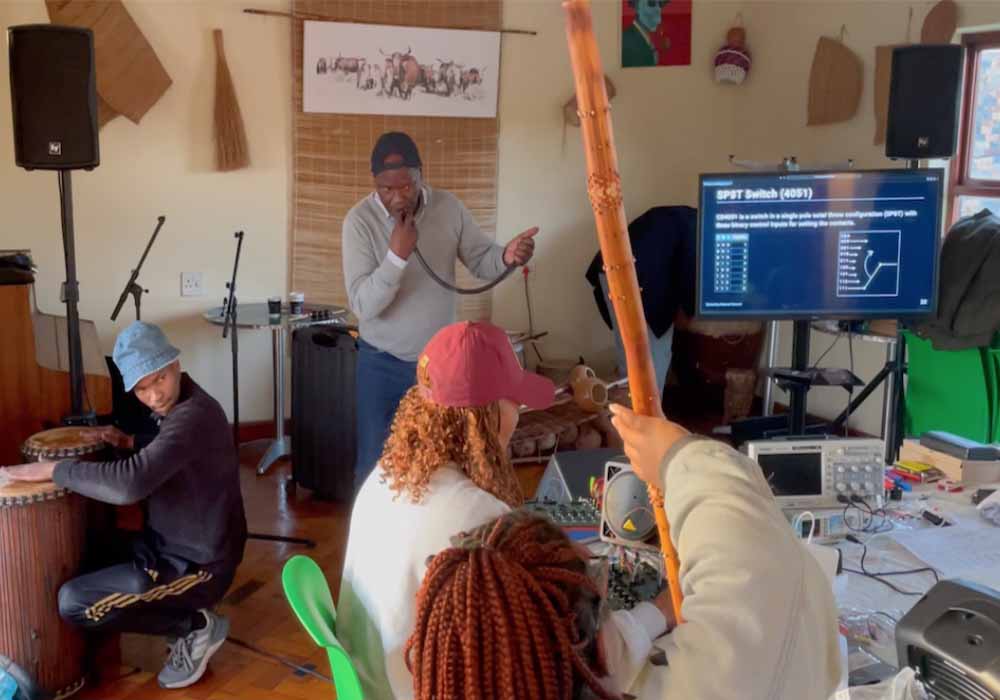
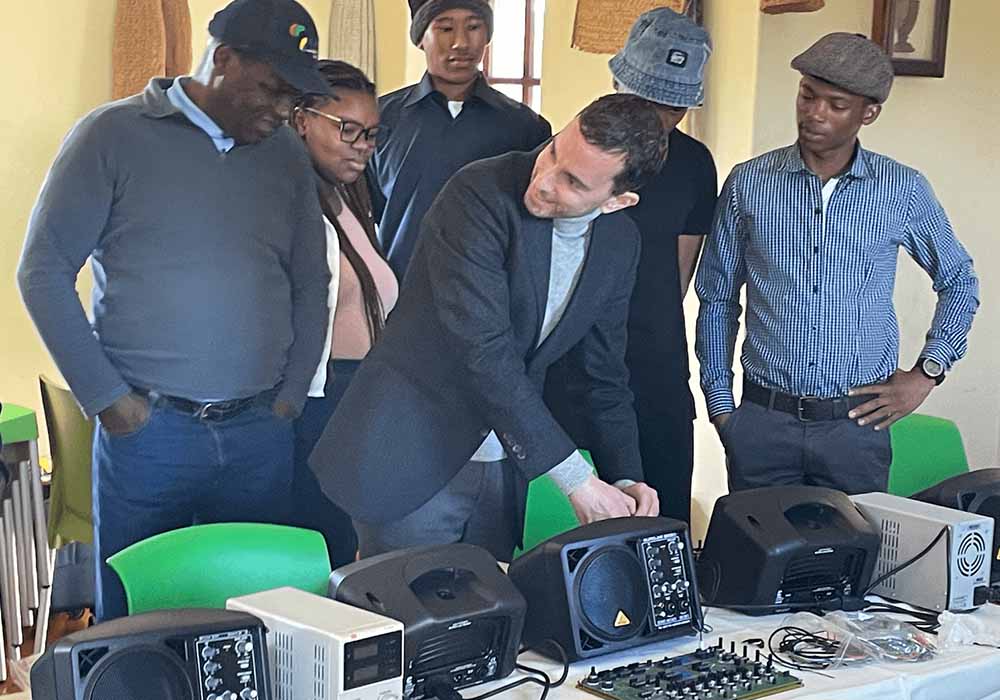
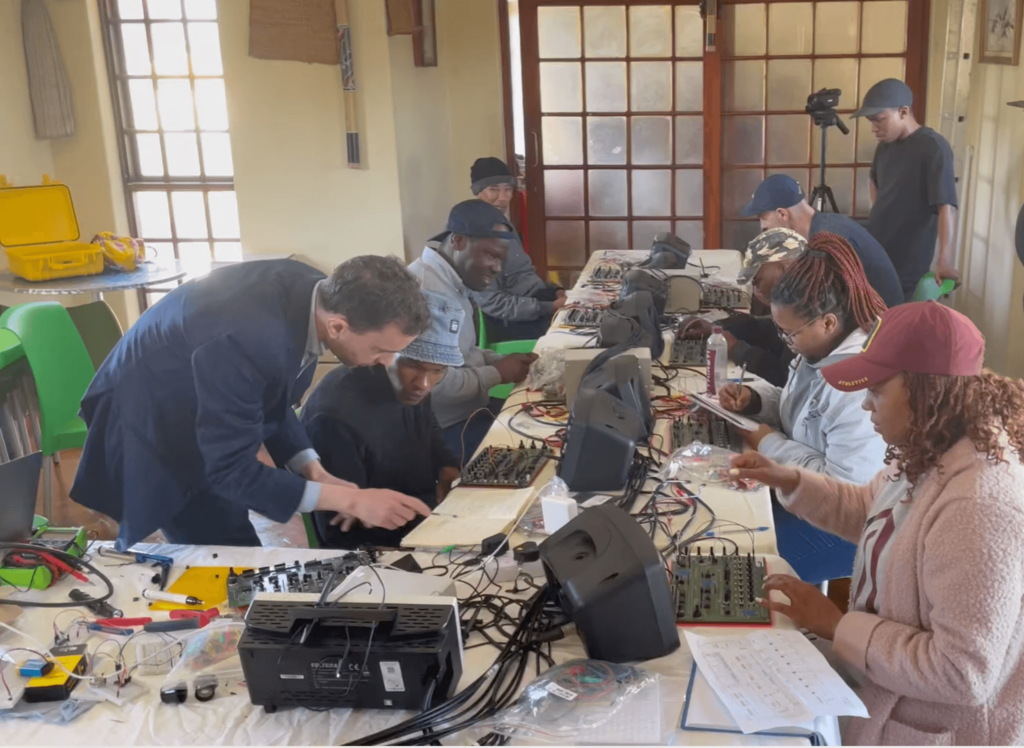
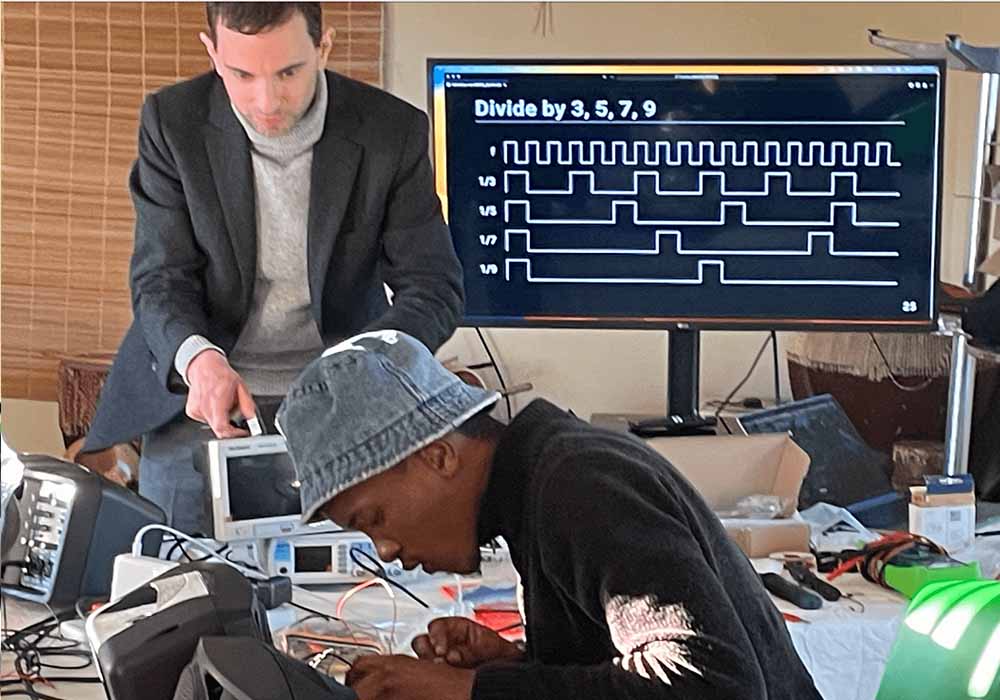
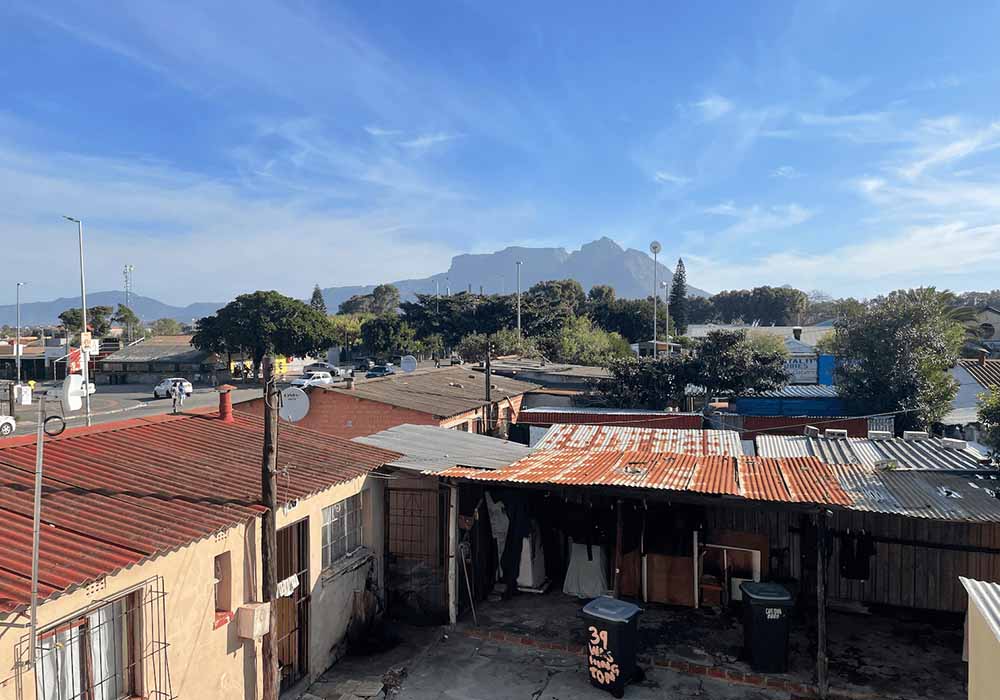
2023
BOWED ELECTRONS | 2-5th September 2023 | University of Cape Town
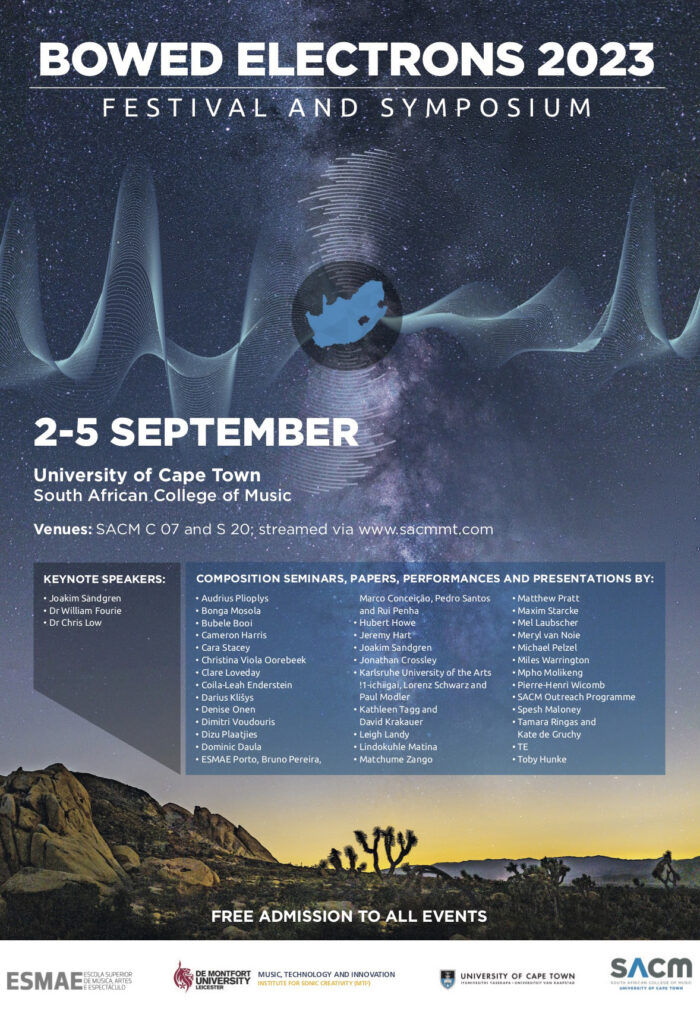
BE is hosted by the music technology section of the South African College of Music, one of the departments of the University of Cape Town. As such, BE is one of five ‘pilot projects’ nurtured by the music technology section. BE is an initiative devoted to the exploration of sound, including the subset ‘music’. It has, over the course of the last few years, obviously attempted to negotiate for itself a foothold in the vibrant South African cultural landscape. At first glance, the fact that this process has been guided by ambitions to secure a place on the cultural fringe, appears counterintuitive. The reward, however, is found in diverse, varied and probing programme content, accommodating and framing a range of contemporary composition currents in a process that culminates in an archived educational toolset. The fact that BE can exist alongside “popular” musicking and the “classical” investment in tradition must be attributed to three factors. Firstly, a group of loyal participants have committed time and energy yearly, resolutely. A technical team has accommodated my wishes without complaint – publicly, at least. And finally, the South African College of Music has provided a home for, and a platform on which to develop this initiative.
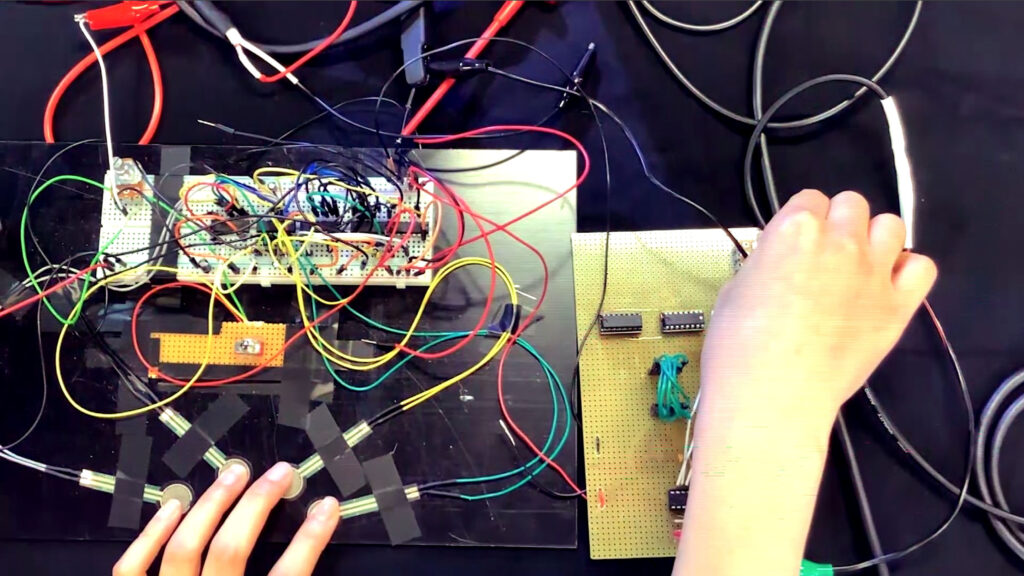
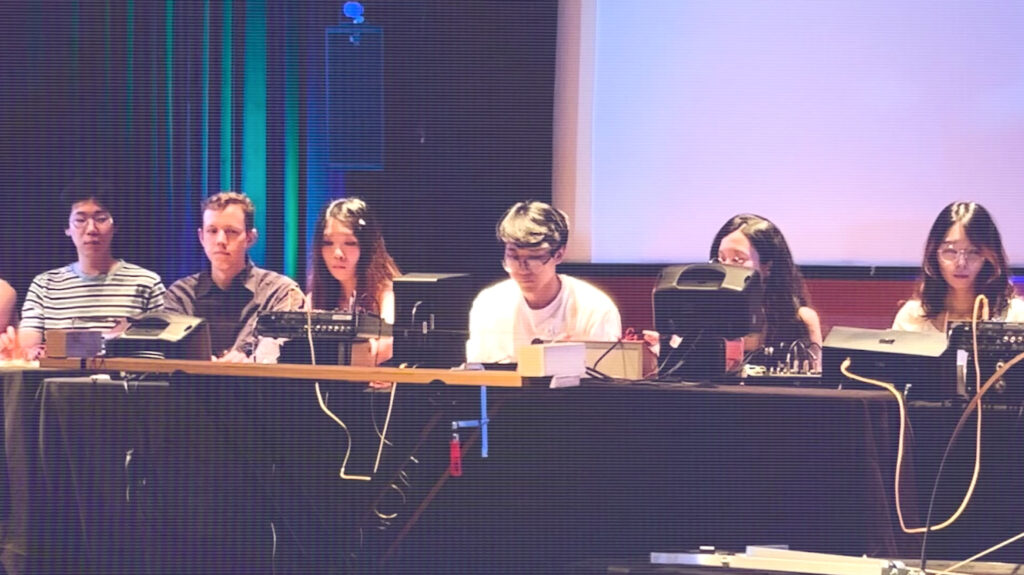
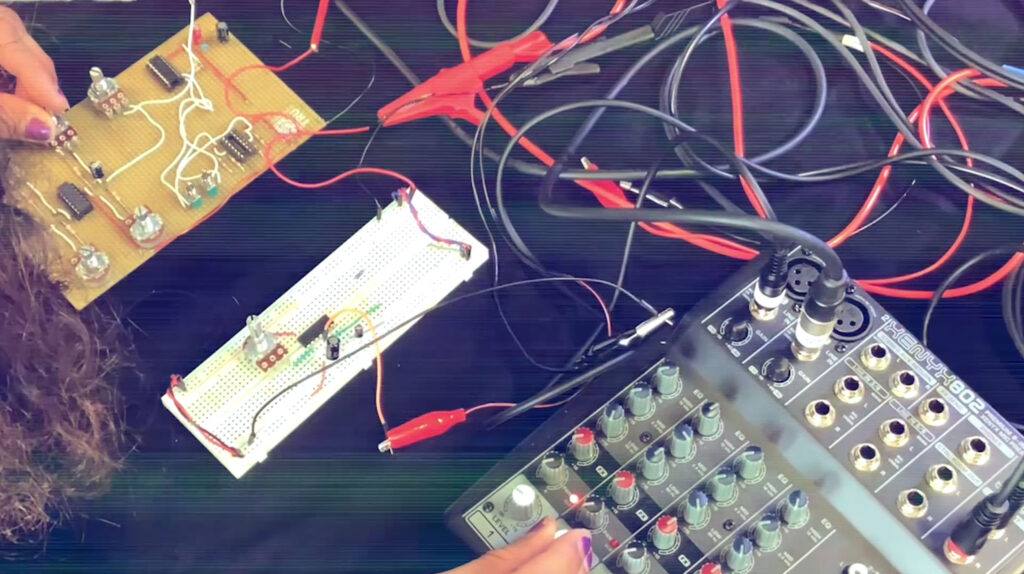
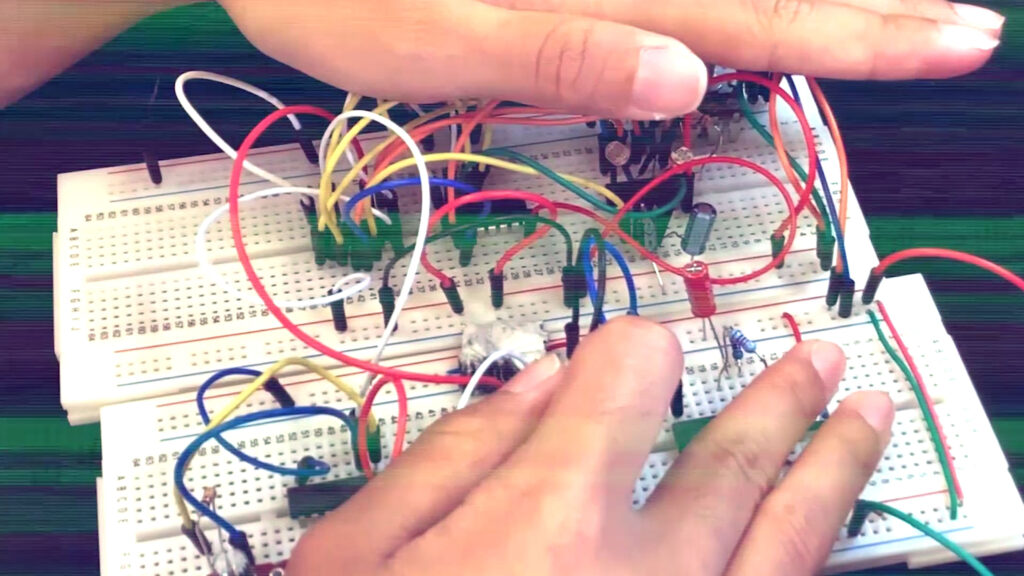
rOundabOut | 21th July 2023 | Center for Art and Media ZKM Kubus
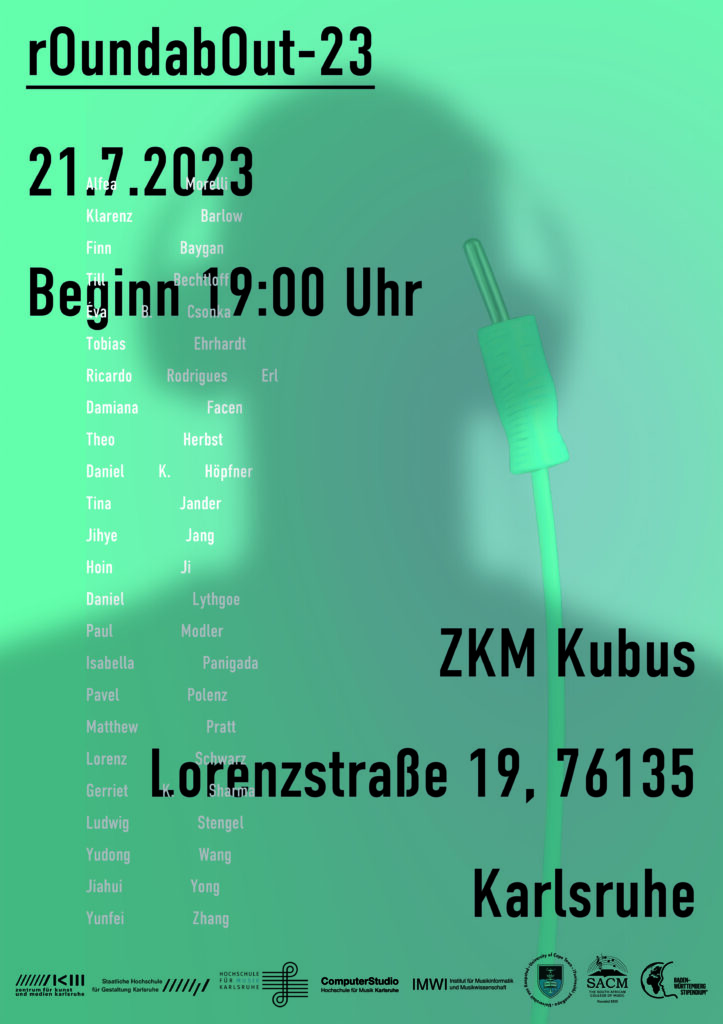
rOundabOut – 2023 is the end-of-semester audiovisual concert at the Karlsruhe University of Design. During this event, students showcase their compositions and artworks. The spectrum of presentations is diverse, spanning from electro-acoustic compositions to audiovisual works, laptop music, live bands, and newly composed music. rOundabOut serves as a platform for expressing creative ideas, and the stage provides students with the freedom and space to bring their artistic and musical visions to life.
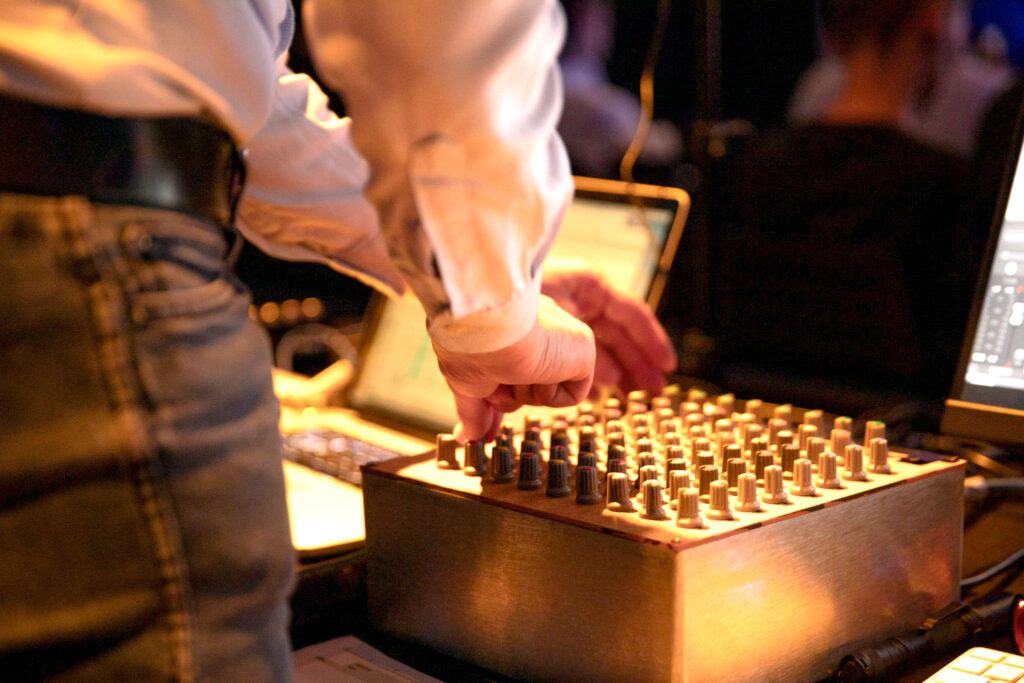
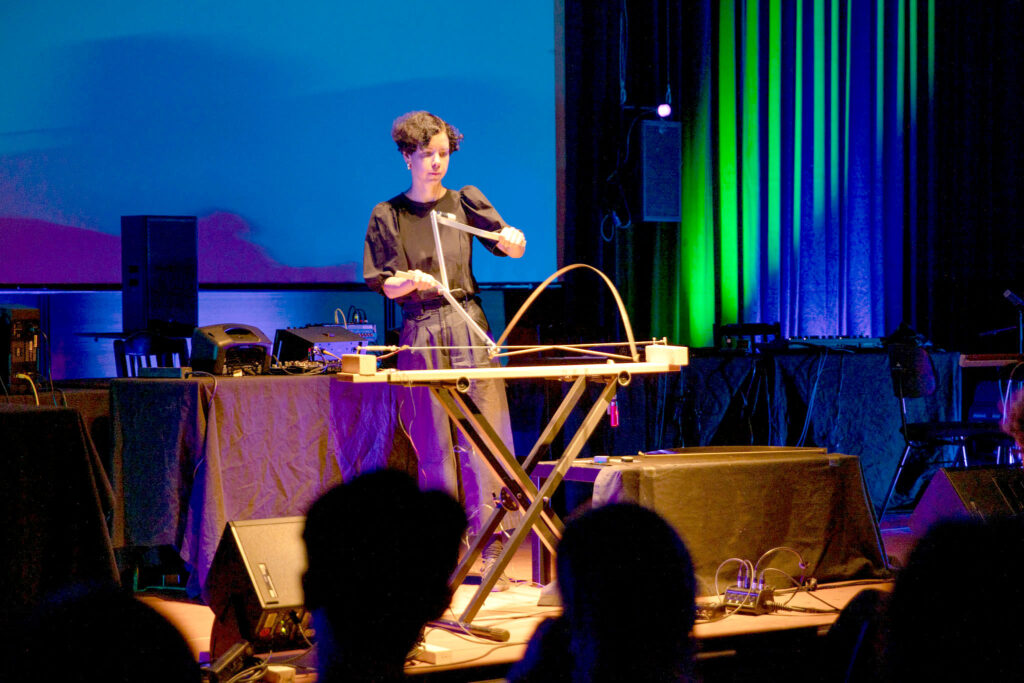
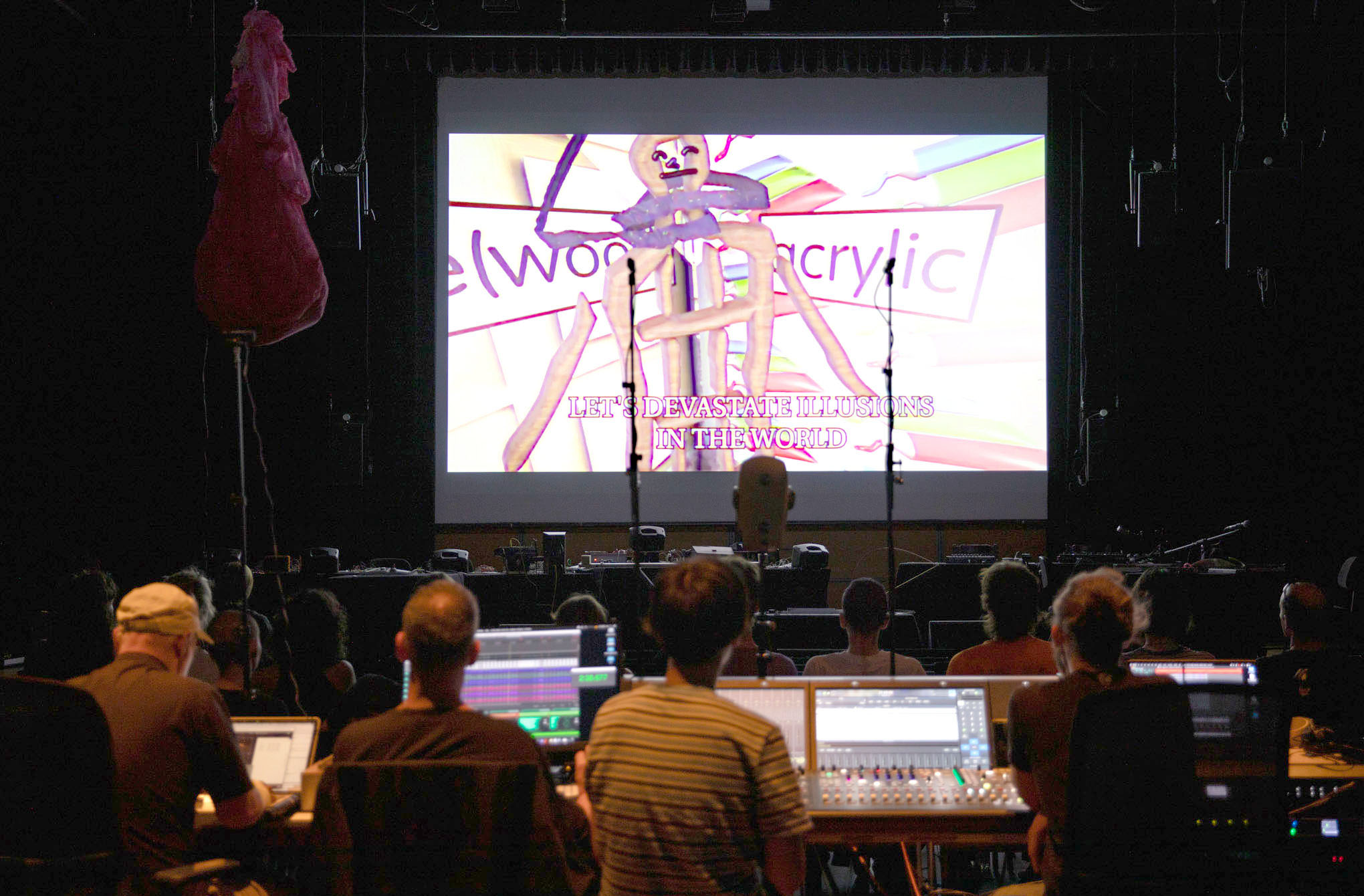
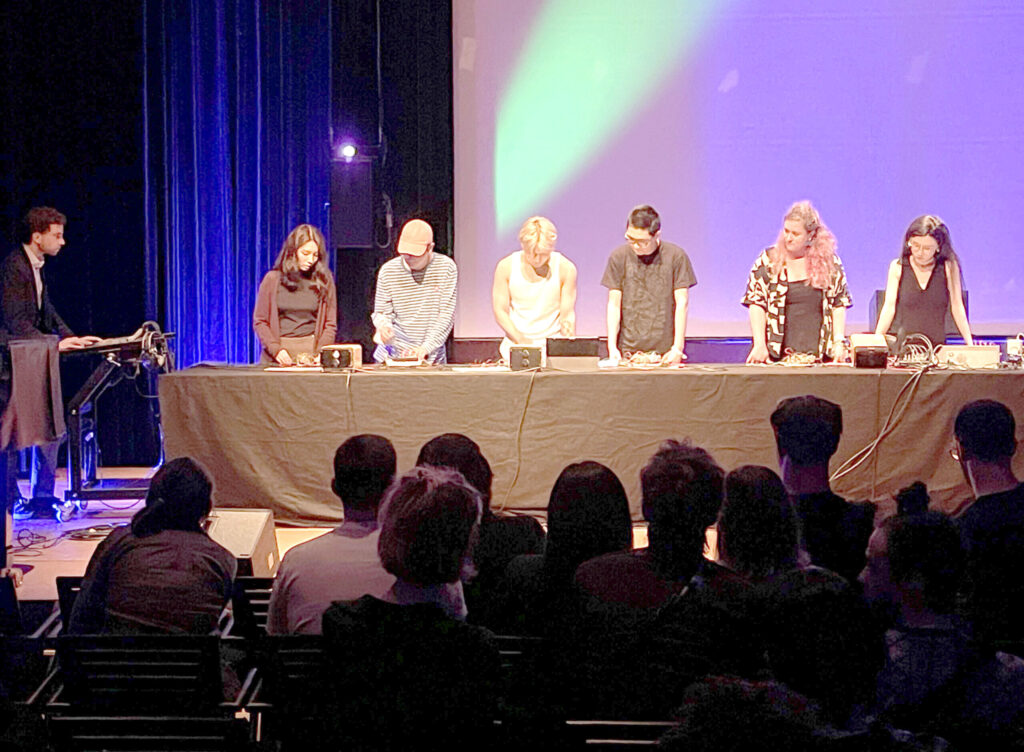
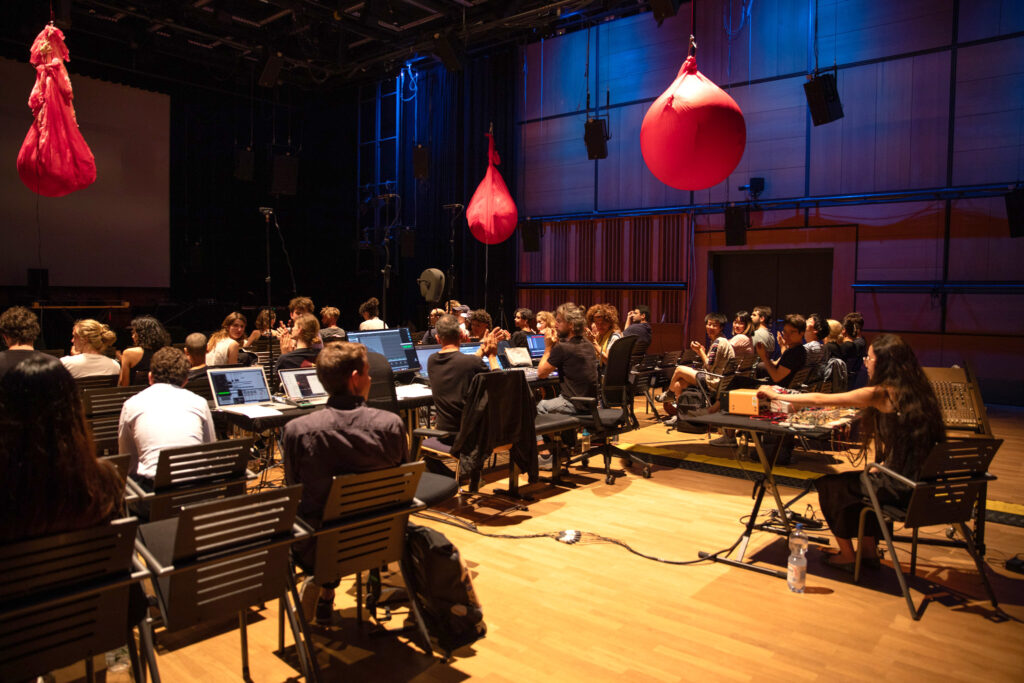
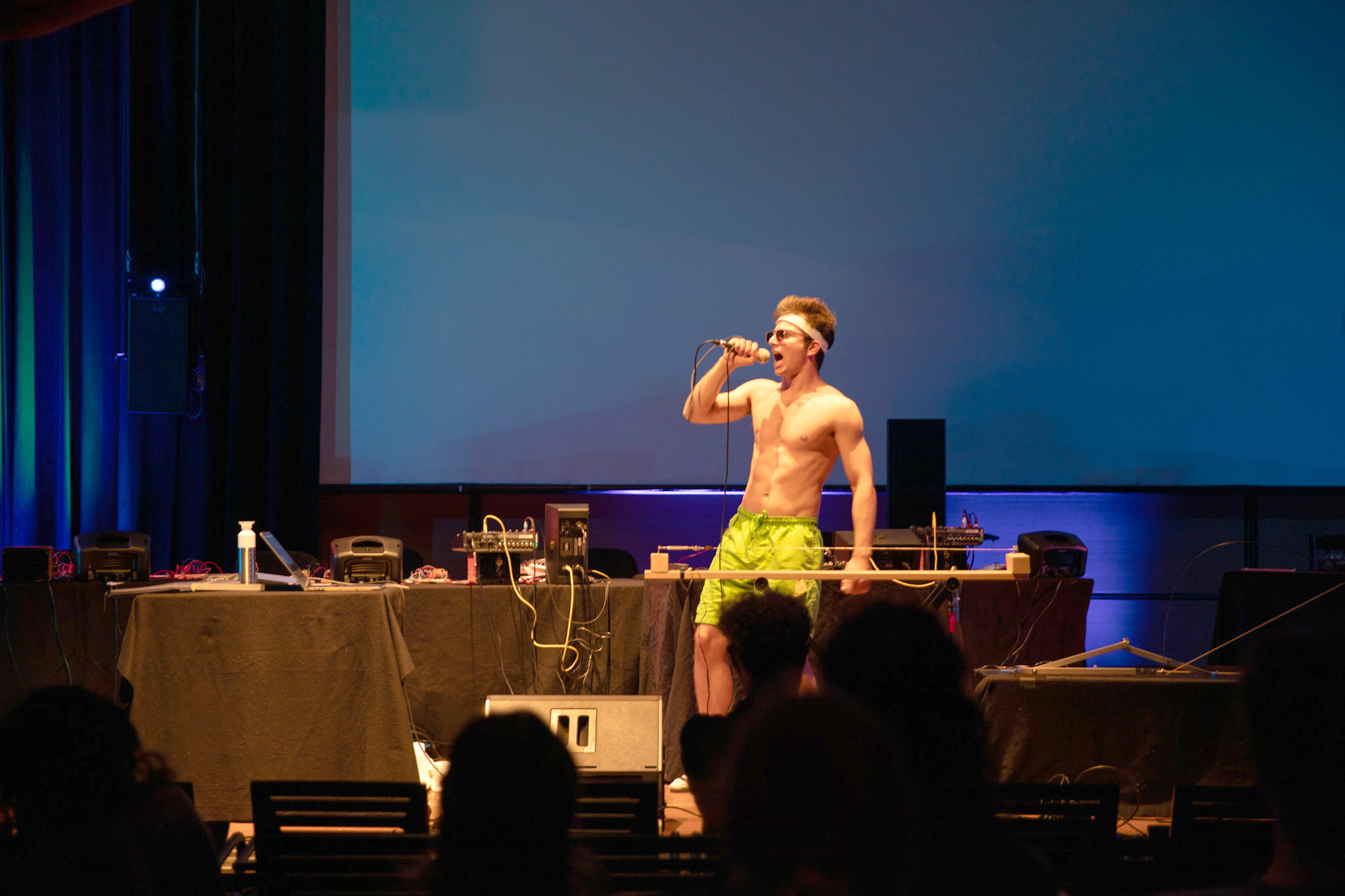
MK-Ultra Sound | 17th Februar 2023 | Karlsruhe University of Music
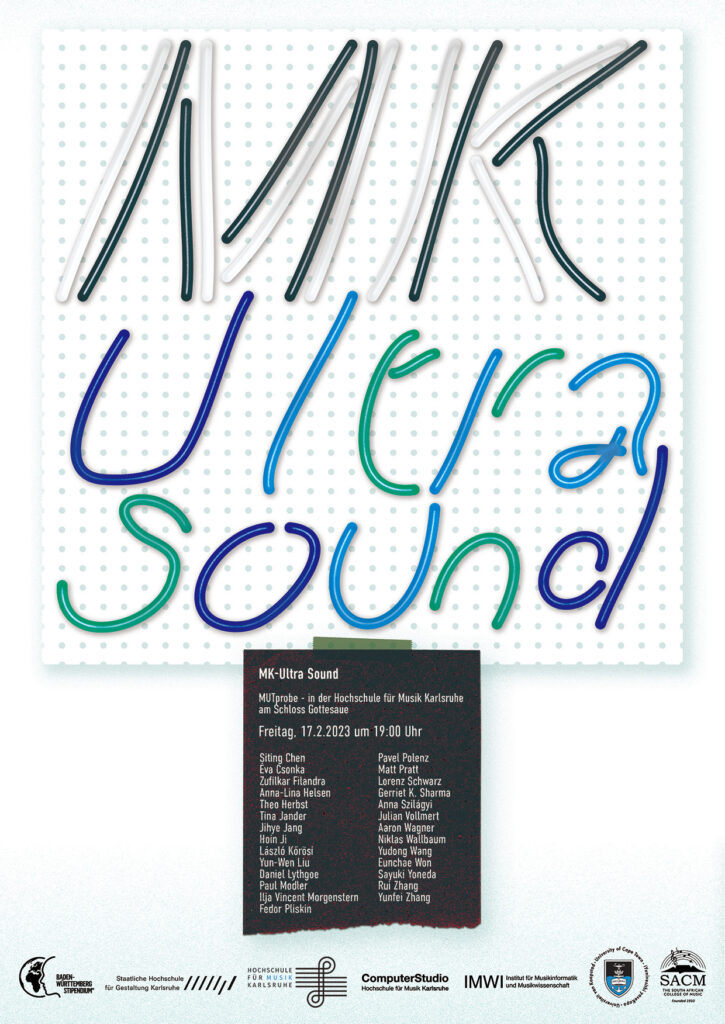
MK-UltraSound ist das audio-visuelle Konzert zum Semesterende der Hochschule für Gestaltung Karlsruhe. Studenten führen ihre Kompositionen und Arbeiten auf. Das Spektrum ist offen und reicht von elektroakustischen Kompositionen über audiovisuelle Kompositionen, Laptopmusik bis zu Live-Bands und neuer komponierter Musik. UltraSound ist Plattform zur Artikulation der Ideen. Die Bühne ist Freiraum und Realisationsraum der künstlerischen und musikalischen Vorgaben und Ziele der Studenten.
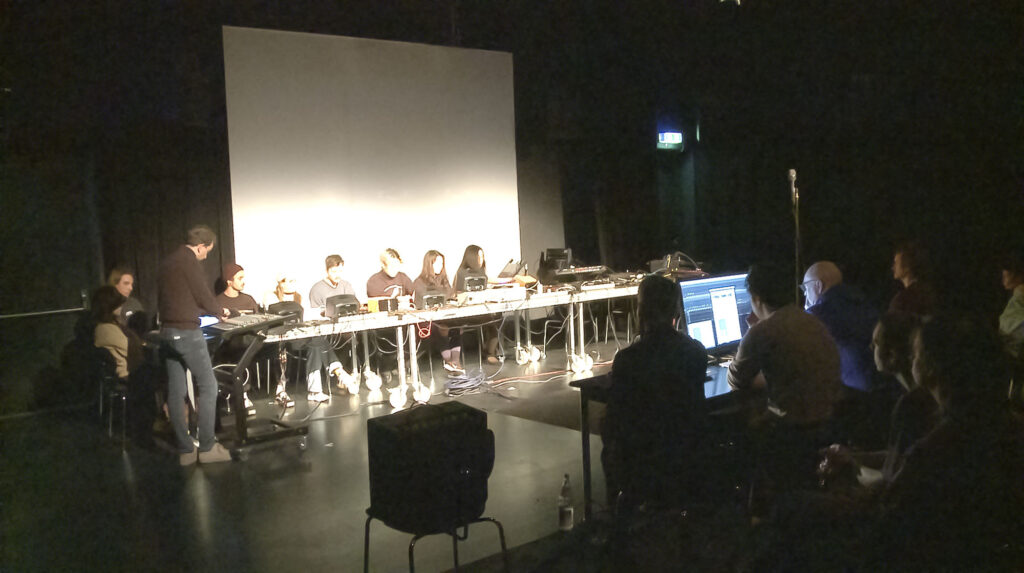
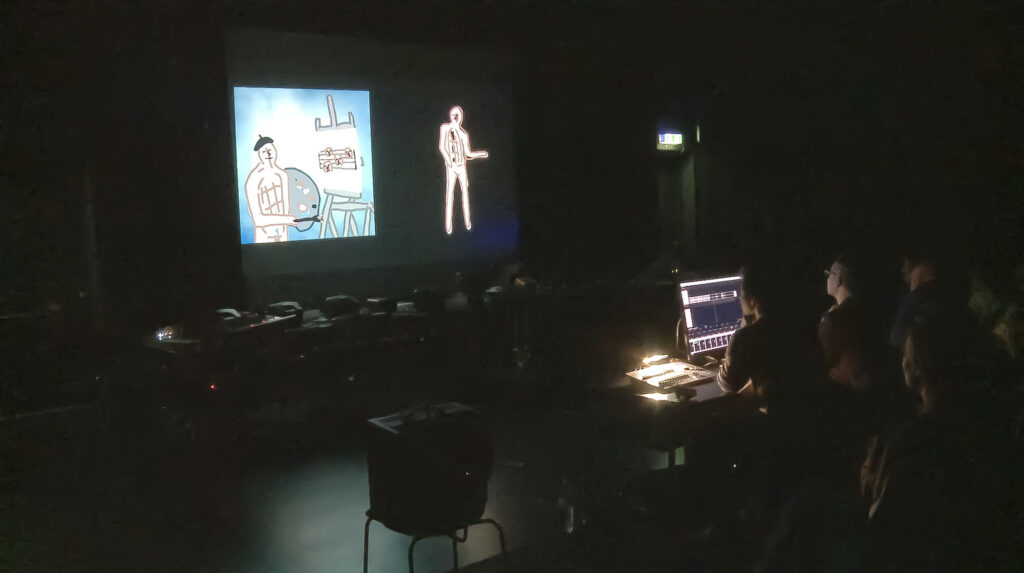
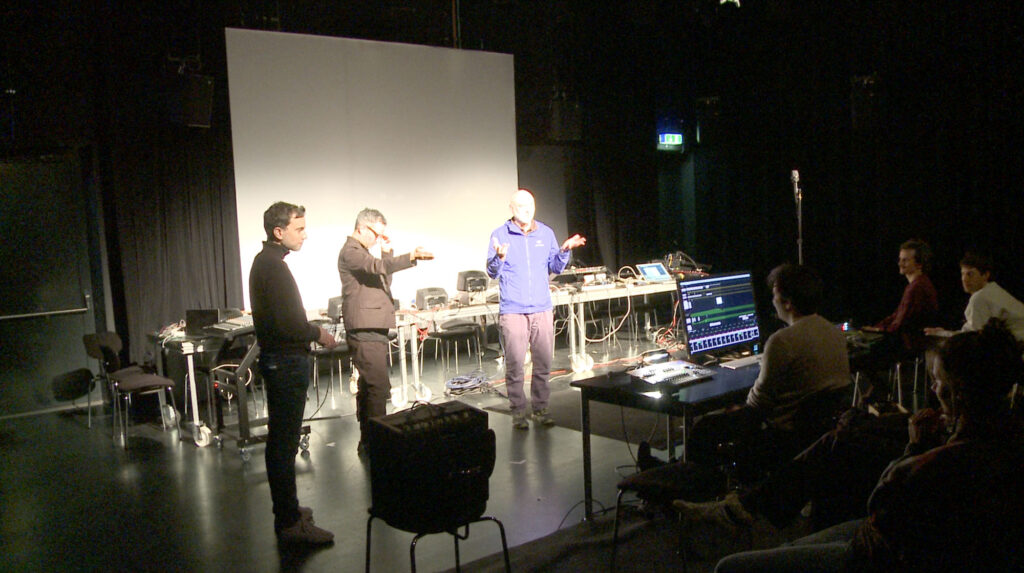
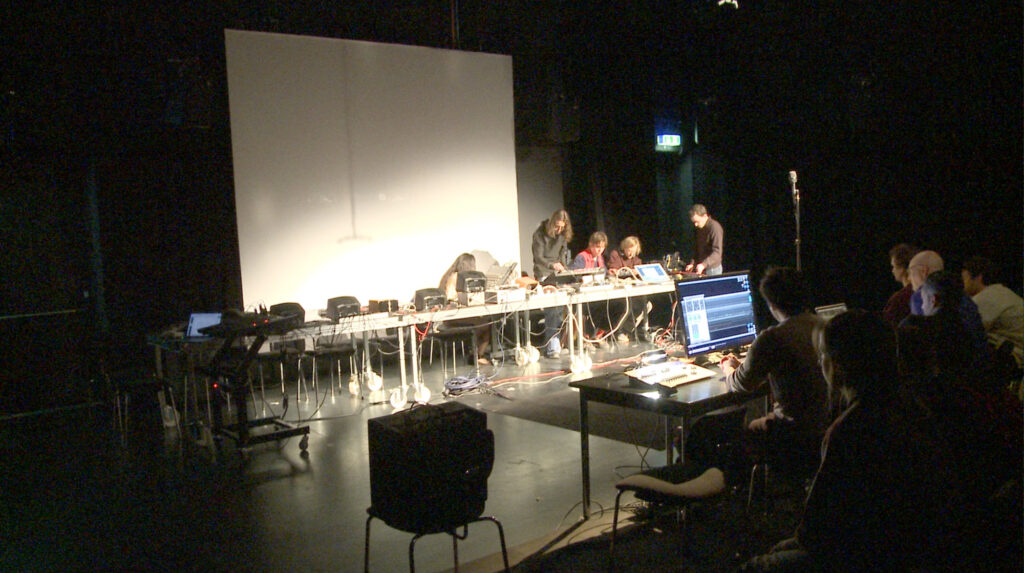
INTERCULTURAL SEMINAR II
INTERCULTURAL, MEDIAL, MEDIA AND MUSICAL PRACTICES. (SOUTH) AFRICAN COMPOSERS, MEDIA ARTISTS, PRACTITIONERS
This brief introductory seminar series will be probing aspects of the perhaps unprecedented current interest in and engagement with sound, art and media resonating in some manner, shape or form with the African continent. The seminars will be exploratory, striving to stimulate debate focussed on interrogating and understanding transitional, reciprocal creative domains and practices on the one hand. On the other, sufficient time for listening, appreciation and practical tasks will be allocated.
2022
BOWED ELECTRONS | 3-7th September 2022 | University of Cape Town
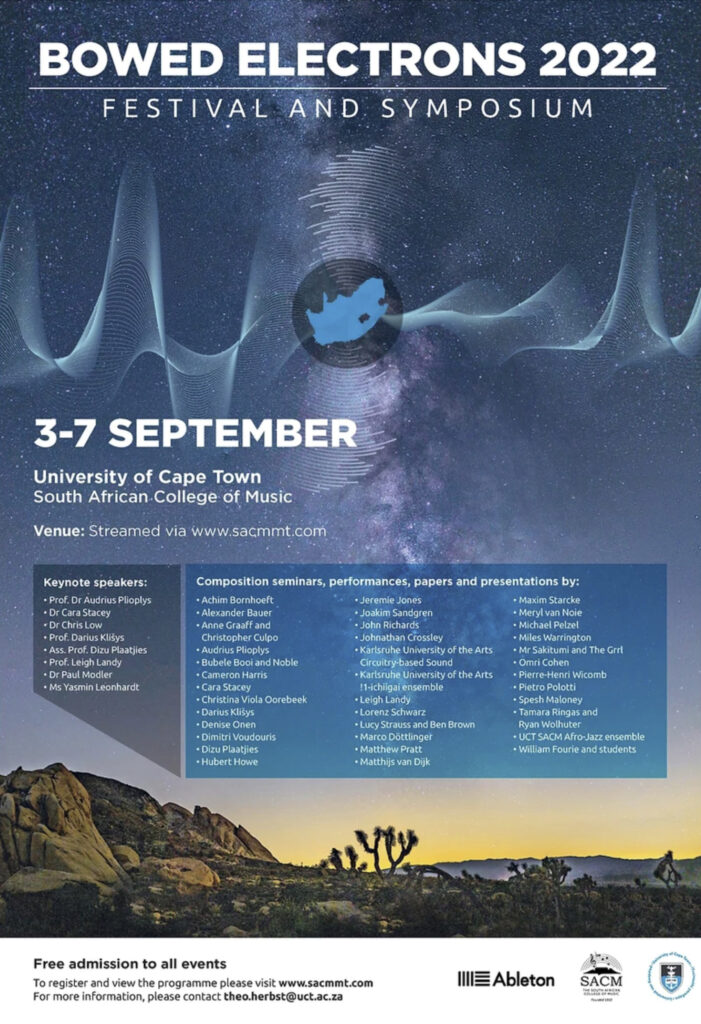
BE is hosted by the music technology section of the South African College of Music, one of the departments of the University of Cape Town. As such, BE is one of five ‘pilot projects’ nurtured by the music technology section. BE is an initiative devoted to the exploration of sound, including the subset ‘music’. It has, over the course of the last few years, obviously attempted to negotiate for itself a foothold in the vibrant South African cultural landscape. At first glance, the fact that this process has been guided by ambitions to secure a place on the cultural fringe, appears counterintuitive. The reward, however, is found in diverse, varied and probing programme content, accommodating and framing a range of contemporary composition currents in a process that culminates in an archived educational toolset. The fact that BE can exist alongside “popular” musicking and the “classical” investment in tradition must be attributed to three factors. Firstly, a group of loyal participants have committed time and energy yearly, resolutely. A technical team has accommodated my wishes without complaint – publicly, at least. And finally, the South African College of Music has provided a home for, and a platform on which to develop this initiative.
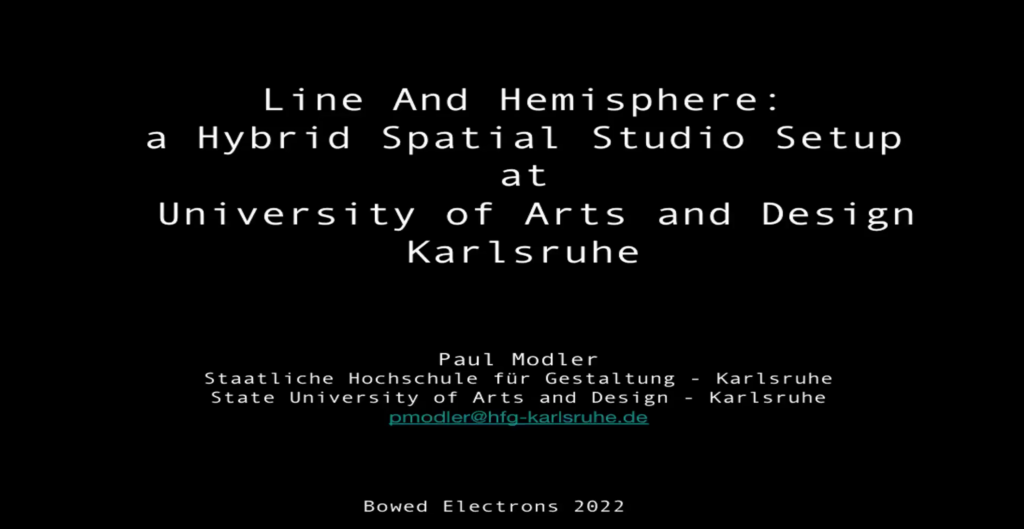
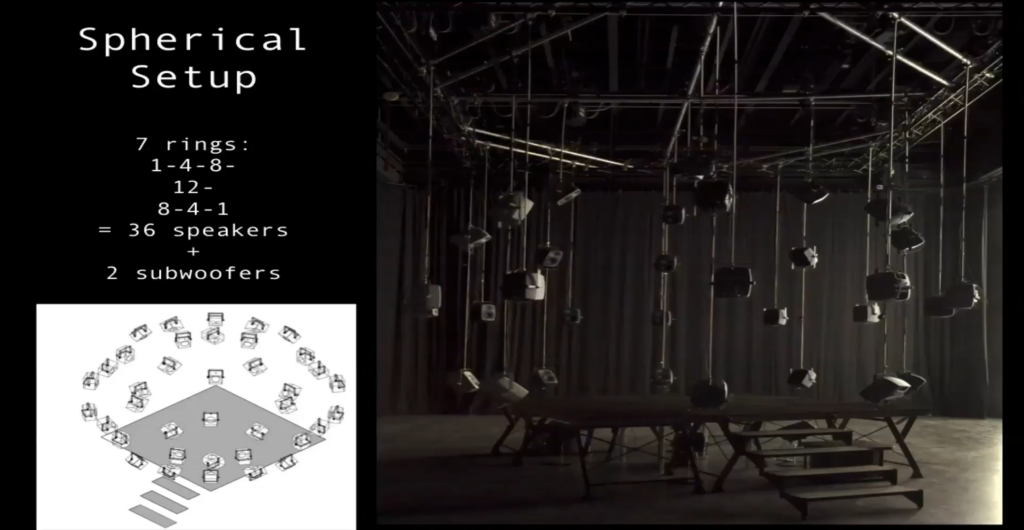
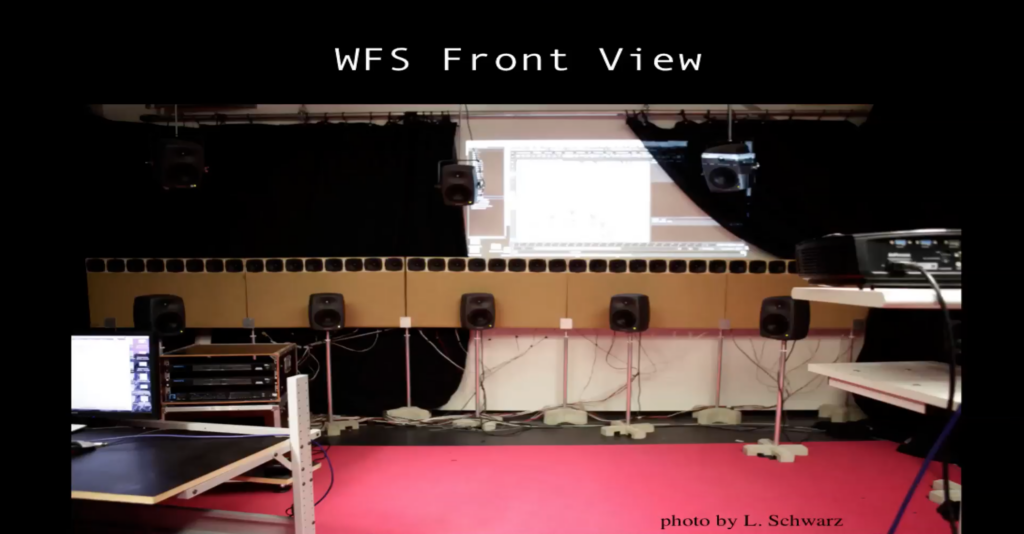
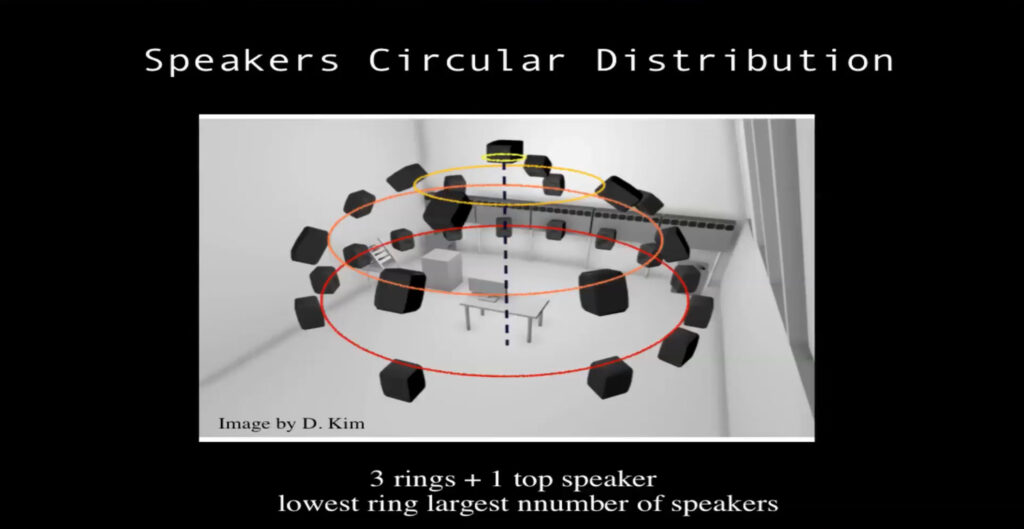
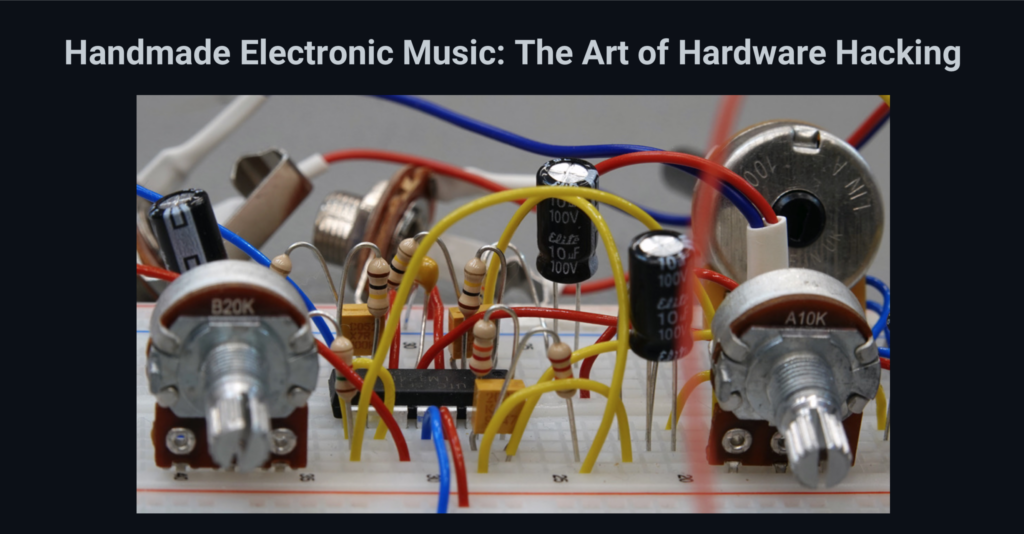
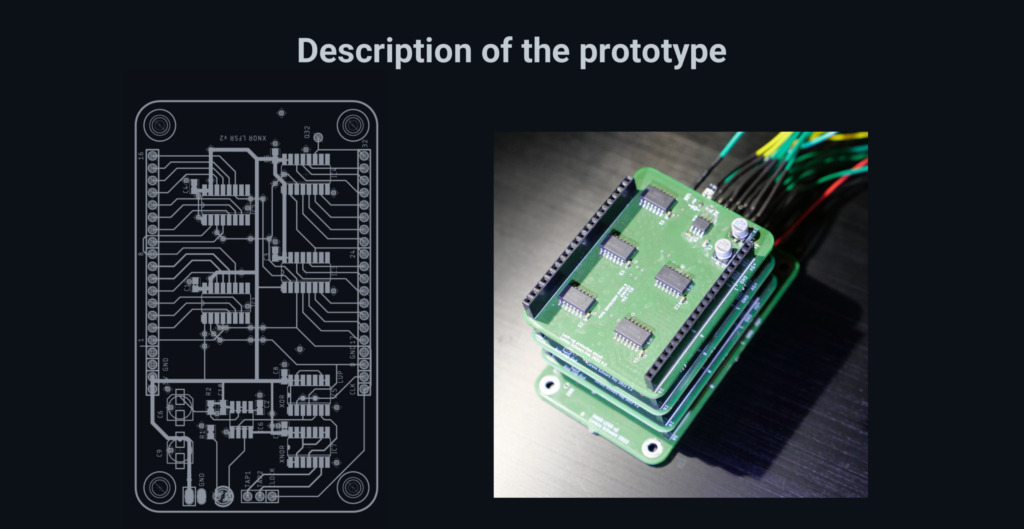
rOundabOut | 22th July 2022 | KINEMATHEK KARLSRUHE
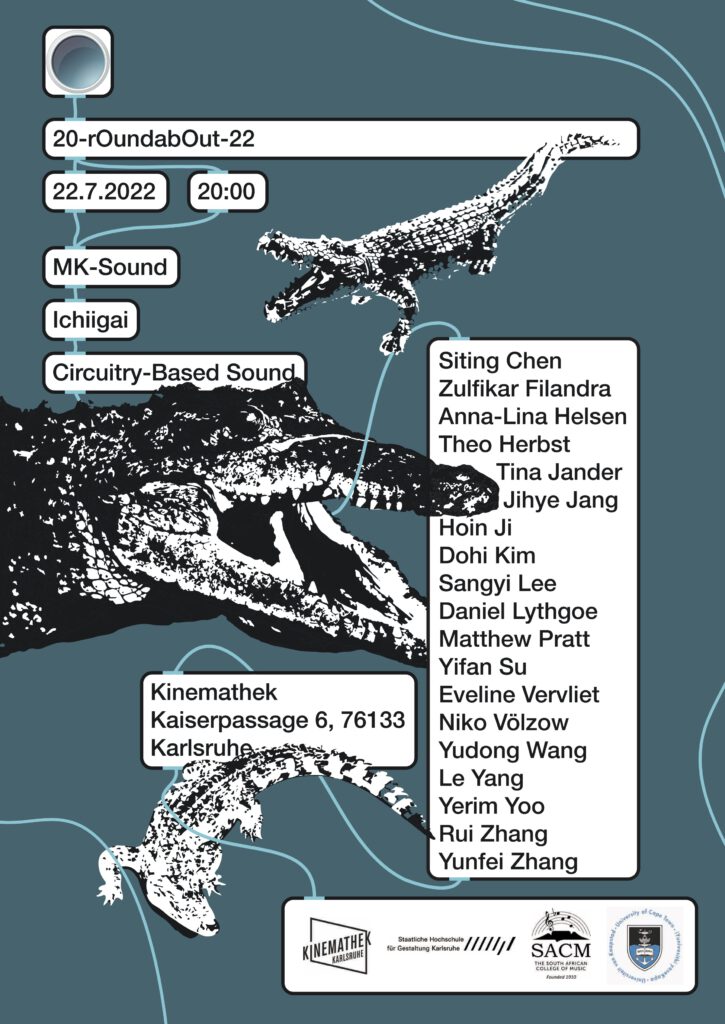
rOundabOut is the end-of-semester audiovisual concert at the Karlsruhe University of Arts and Design. During this event, students showcase their compositions and artworks. The spectrum of presentations is diverse, spanning from electro-acoustic compositions to audiovisual works, laptop music, live bands, and newly composed music. rOundabOut serves as a platform for expressing creative ideas, and the stage provides students with the freedom and space to bring their artistic and musical visions to life.
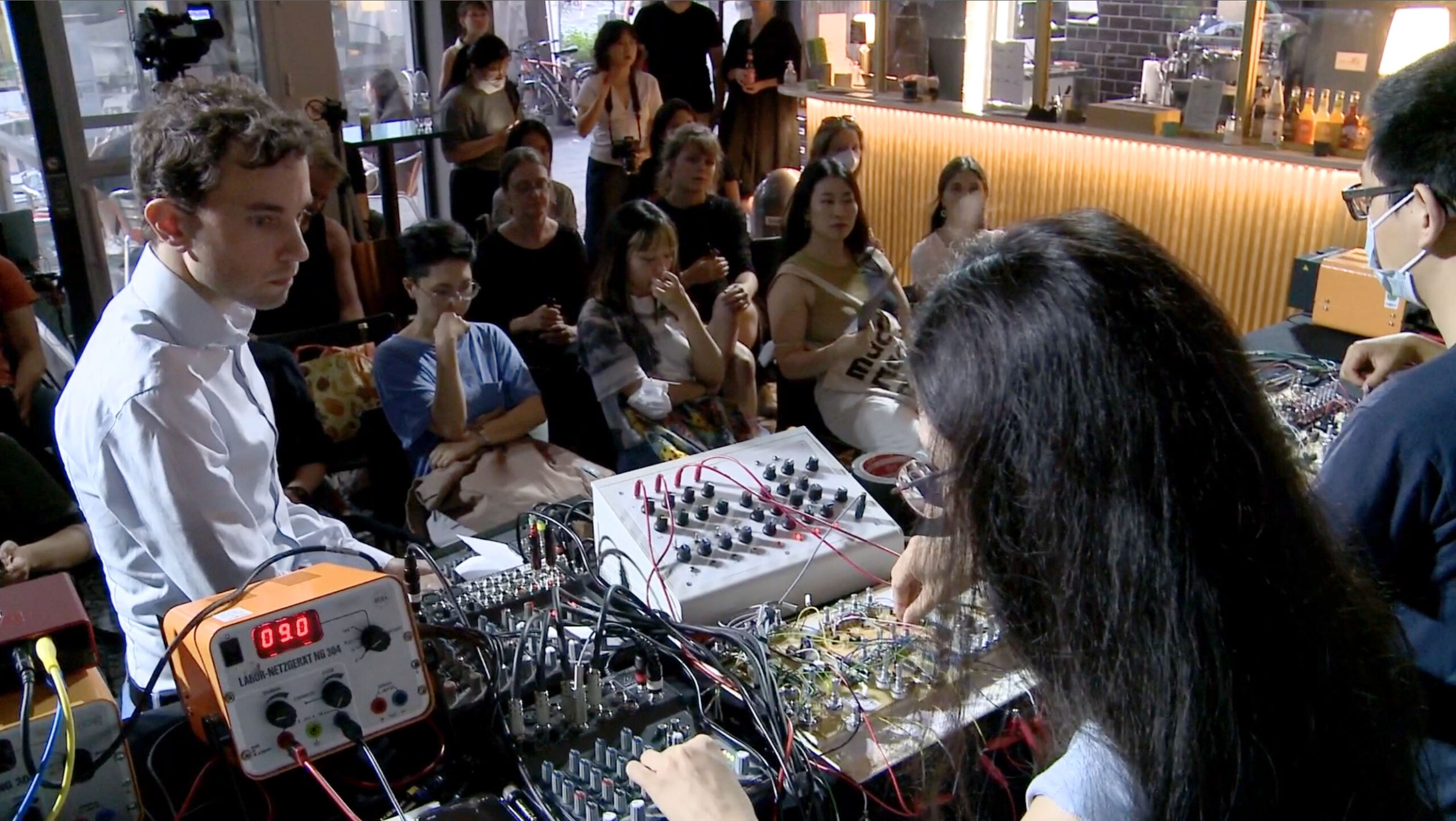
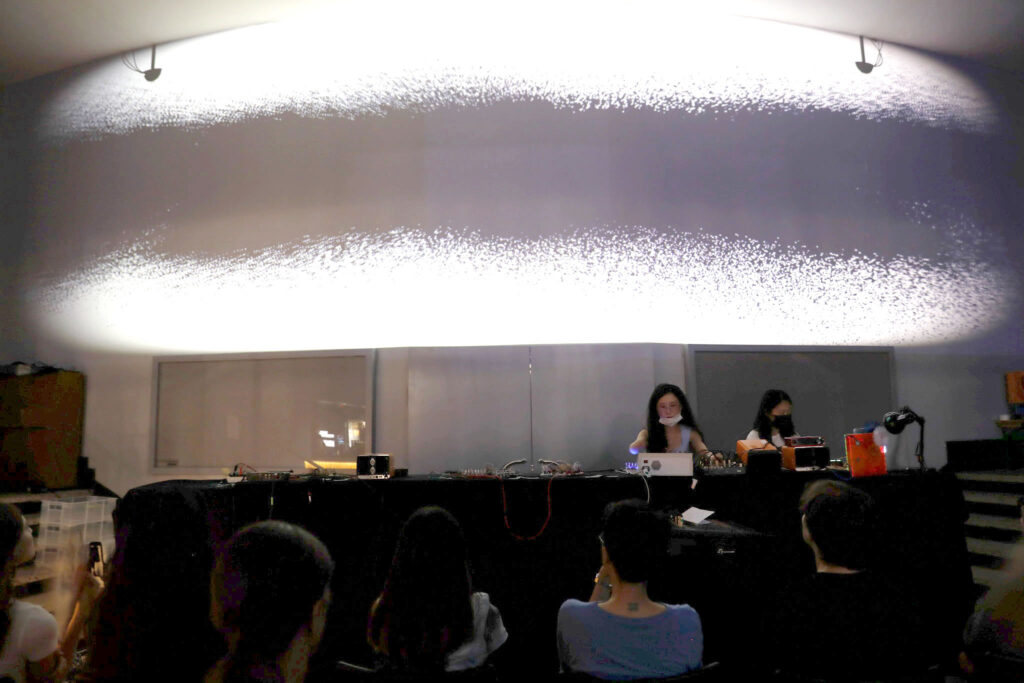
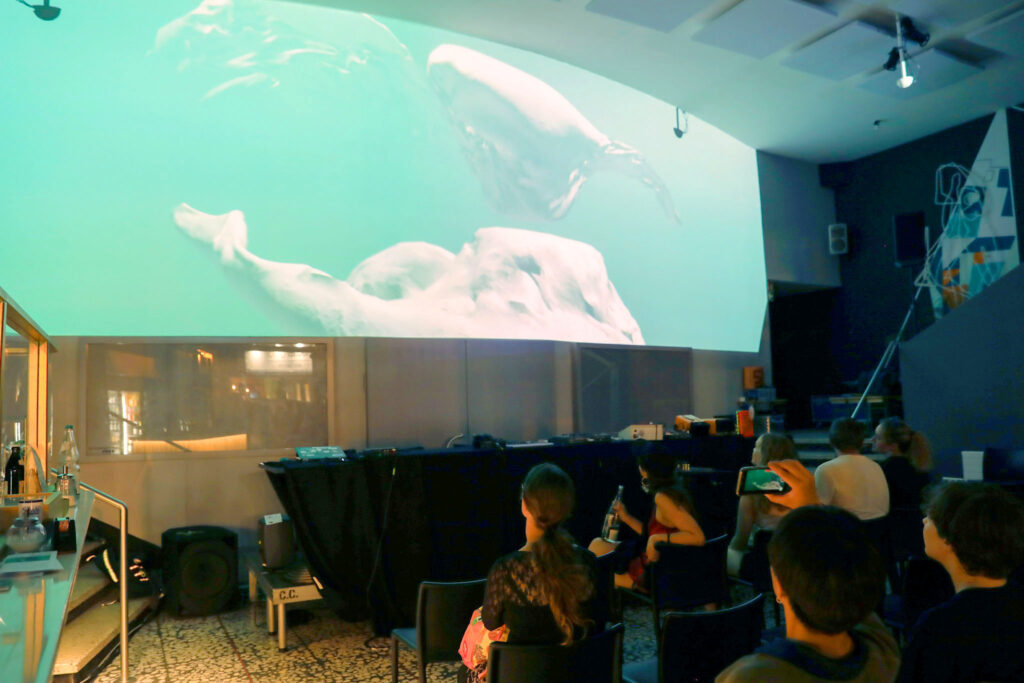
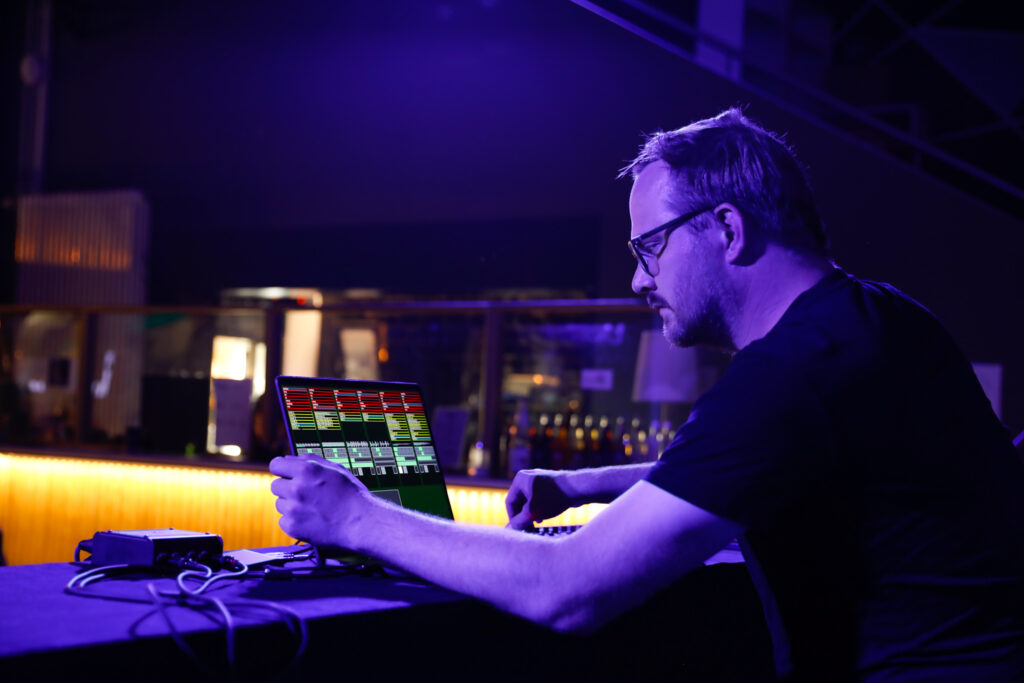
SACM members with ichiigai at next_generation 9.0 | 22-25 September 2023 | Center for Art and Media ZKM
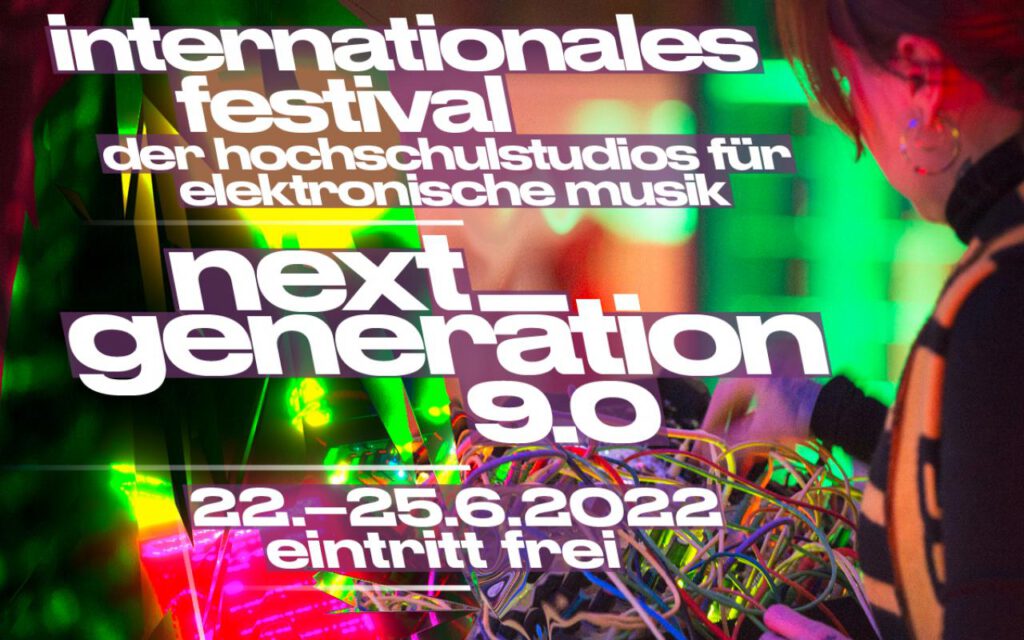
As the largest gathering of university studios for electronic music, „next_generation 9.0“ provides a platform for emerging composers to showcase their innovative compositions.
From Wednesday, June 22 to Saturday, June 25, 2022, the ninth edition of the „next_generation“ festival will take place at the ZKM. Over four days, it will offer an exciting and rich program focused on the latest trends in „Fixed Media,“ „Spatial Music,“ and „Live Electronics.“ Thus, „next_generation 9.0“ guarantees a representative overview of the current creative output of the upcoming generation of composers in the context of technology and art.
This year, students from electronic university studios in Germany, Austria, France, and Switzerland have the opportunity to present their works in concerts and various installations at different locations within the ZKM. They can also engage in discussions about their areas of interest through lectures and conversations. Furthermore, professors and instructors will provide insights into the latest developments in the various studios and departments.
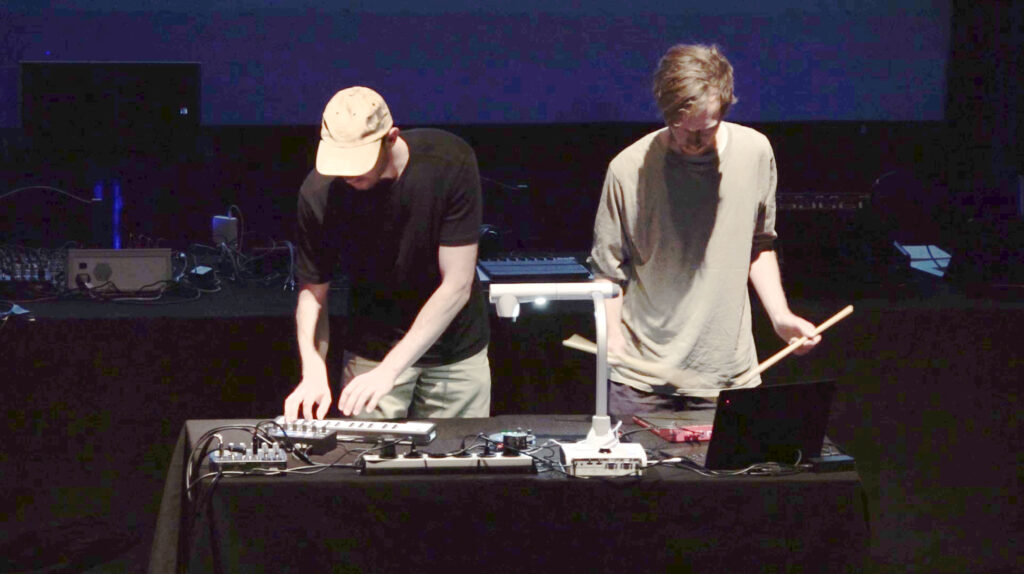
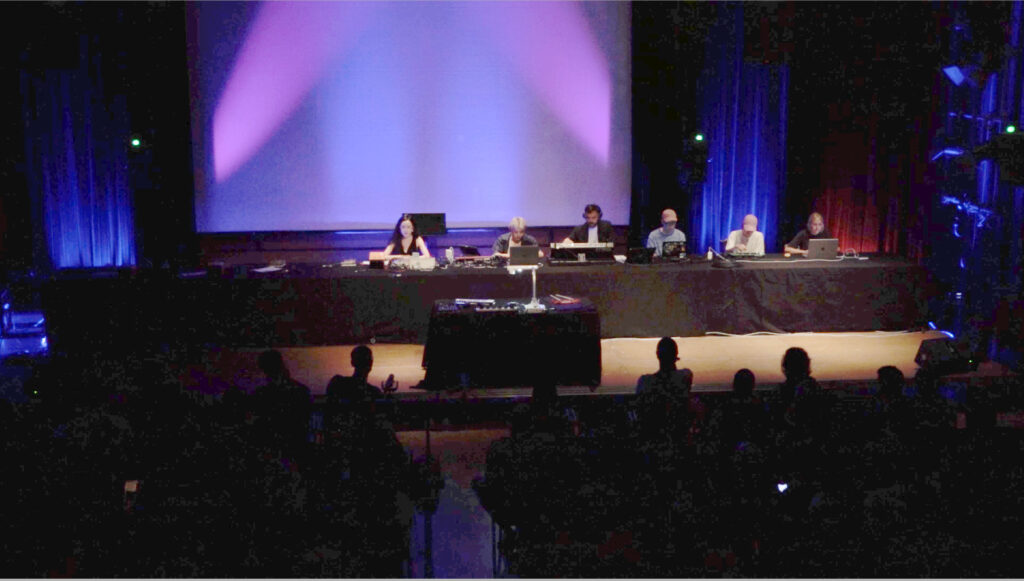
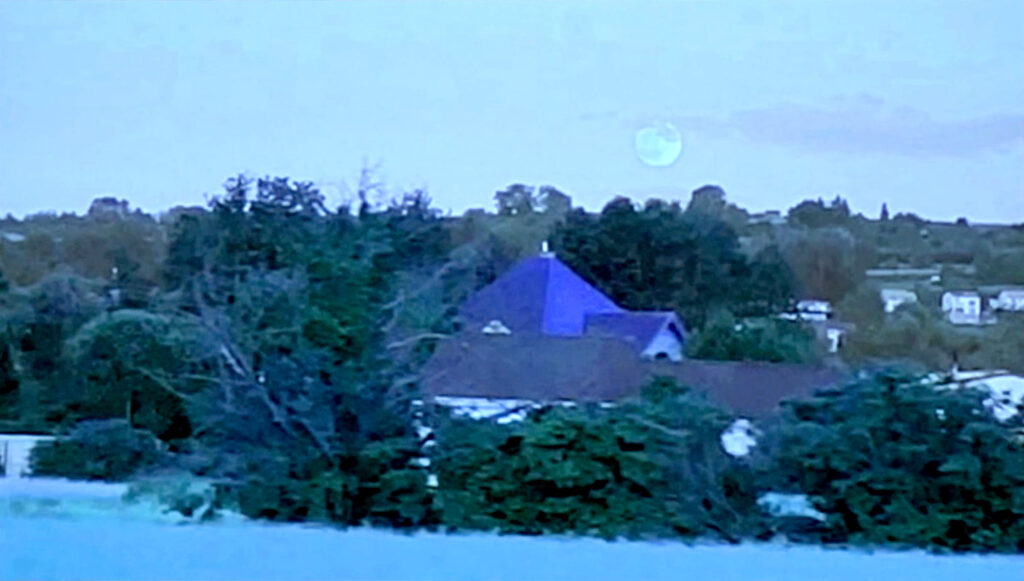
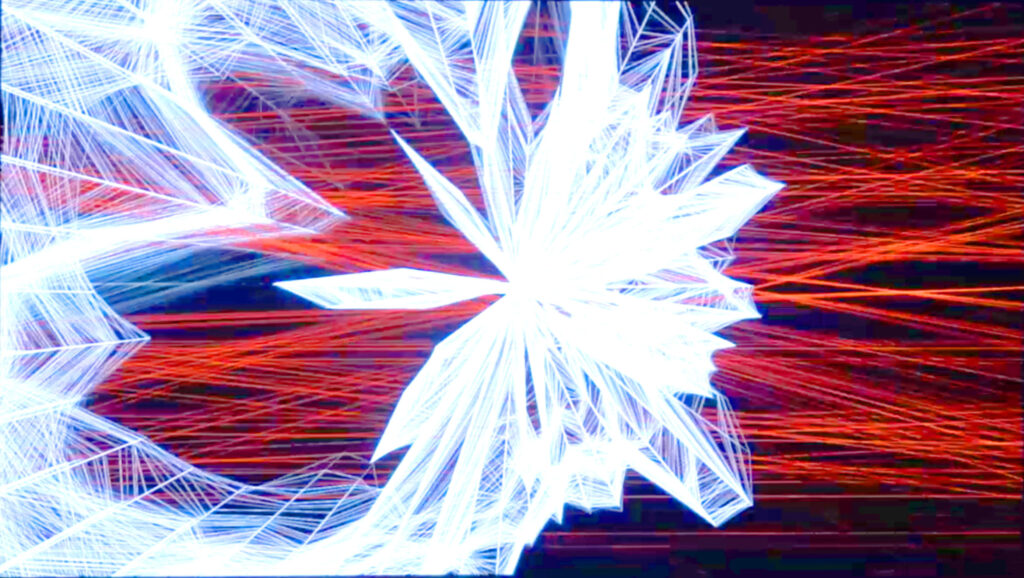
INTERCULTURAL SEMINAR I
INTERCULTURAL, MEDIAL, MEDIA AND MUSICAL PRACTICES. (SOUTH) AFRICAN COMPOSERS, MEDIA ARTISTS, PRACTITIONERS
This brief introductory seminar series will be probing aspects of the perhaps unprecedented current interest in and engagement with sound, art and media resonating in some manner, shape or form with the African continent. The seminars will be exploratory, striving to stimulate debate focussed on interrogating and understanding transitional, reciprocal creative domains and practices on the one hand. On the other, sufficient time for listening, appreciation and practical tasks will be allocated.
!1-ICHIIGAI
This semester we’re sticking with the theme of network music and combining live jamming with online options.
Artistic and musical concepts are being developed for an audiovisual label. The focus is on performance and concert-oriented events.
Jamming – developing – performing… Individual instruments and collaboration concepts should be tried out together at regular intervals.
2021
Inside Sonic | 13 November 2021 | in the Lichthof of the Karlsruhe University of Arts and Design
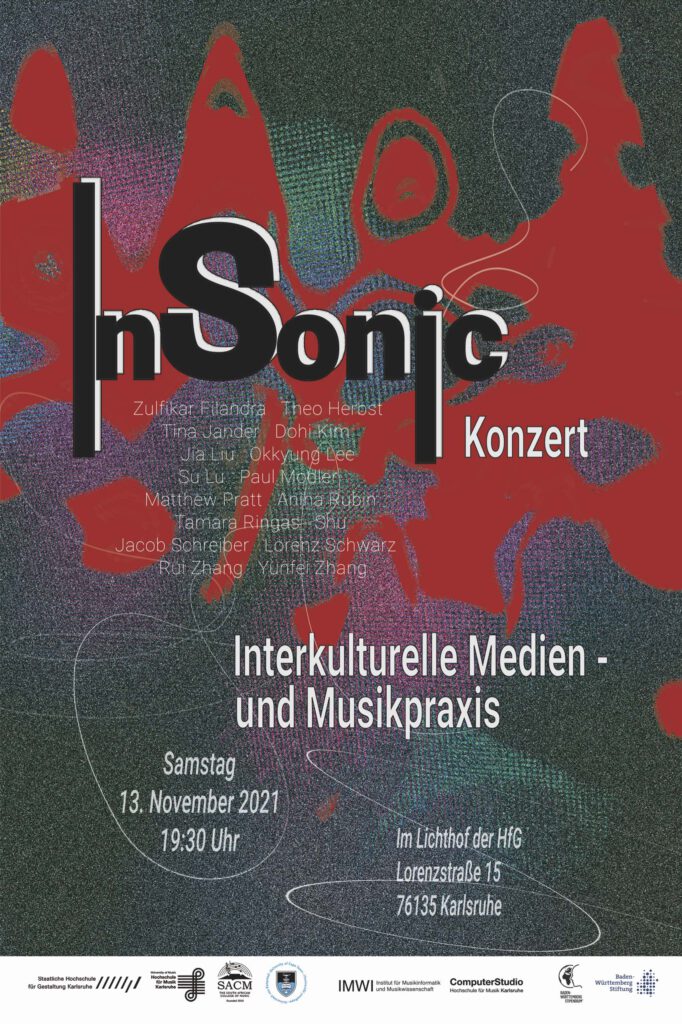
Inside sonic is a project which aims to enable new ways of communication between separated communities. Not restricted to groups which have a strong interest on music, sound and media-art the project identifies this social environment as the research area for ways to establish new relations between cultural identities and cultural commons. A strong focus is on the praxis of art forms in particular aesthetic concepts of sound, sound in space, spatial aspects of culture in general as well as spatial aspects in music, sound and art.
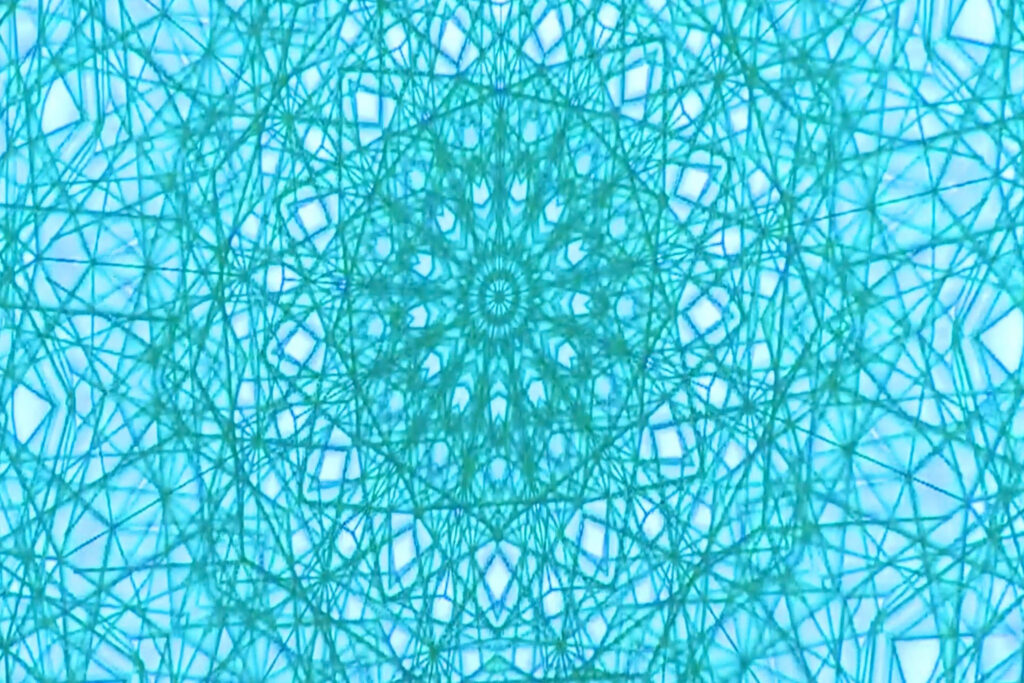
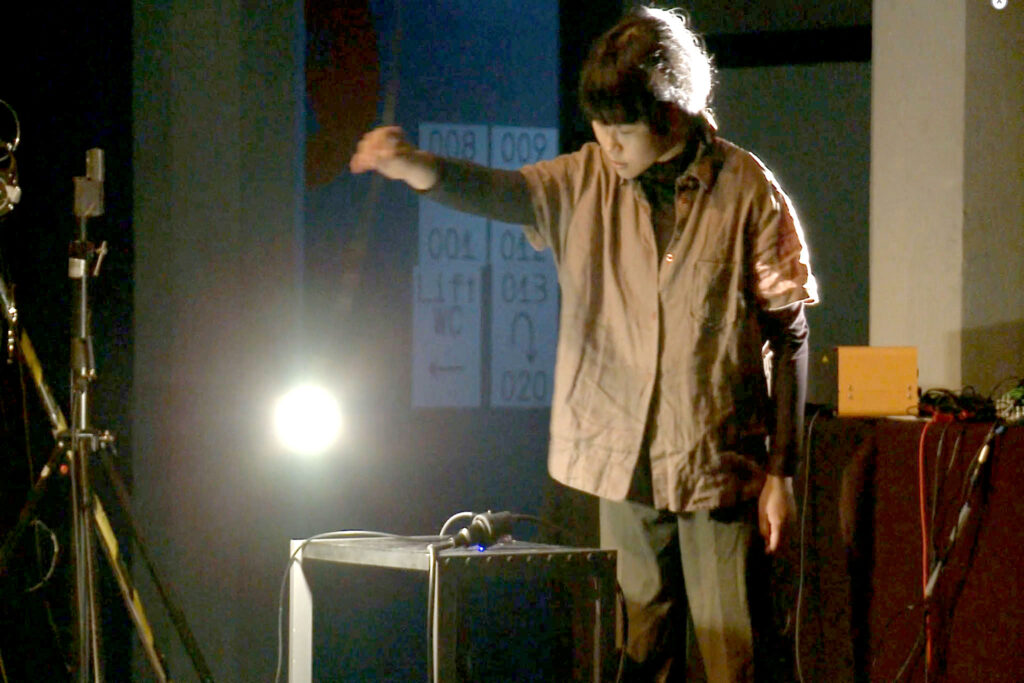
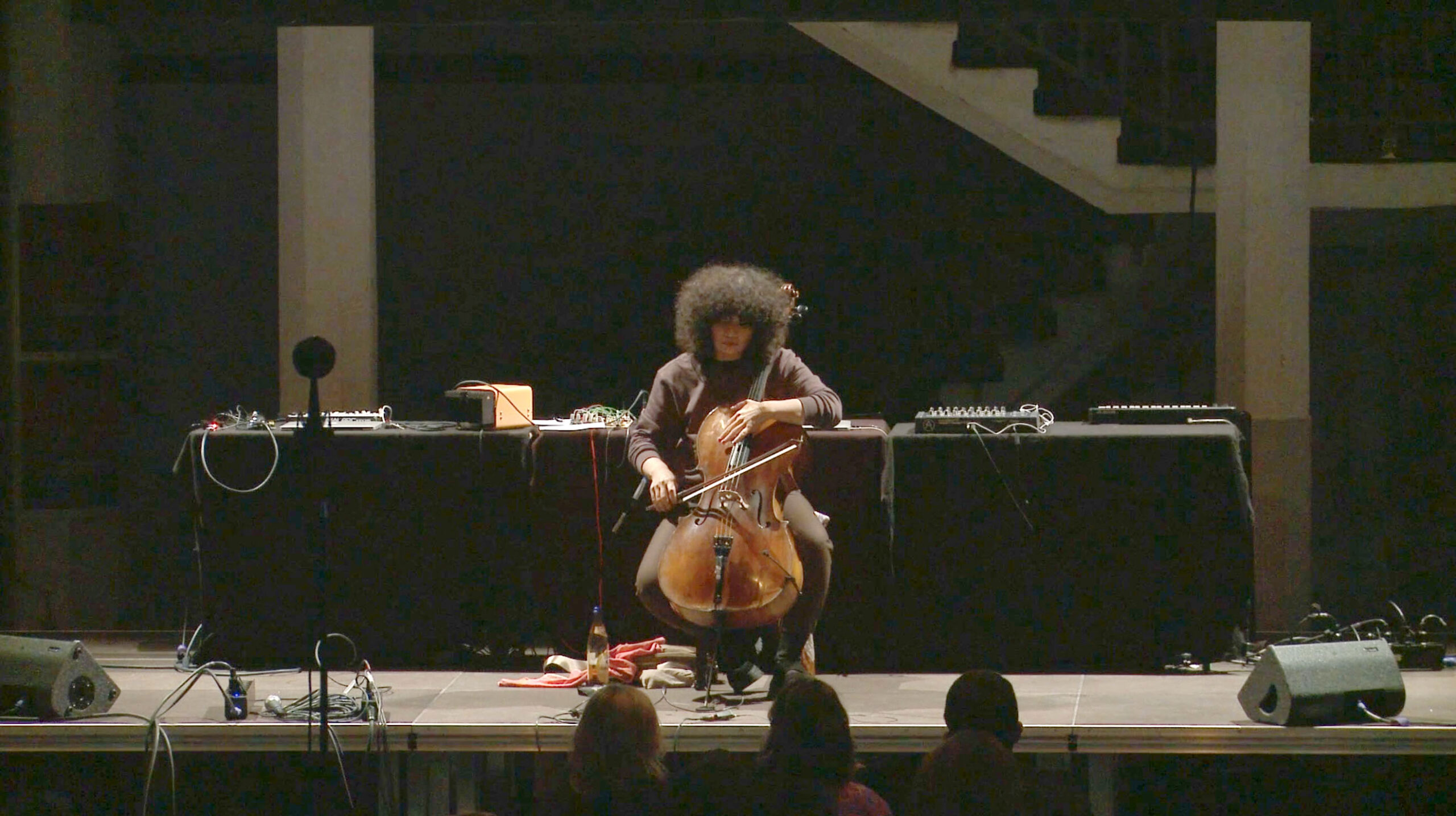
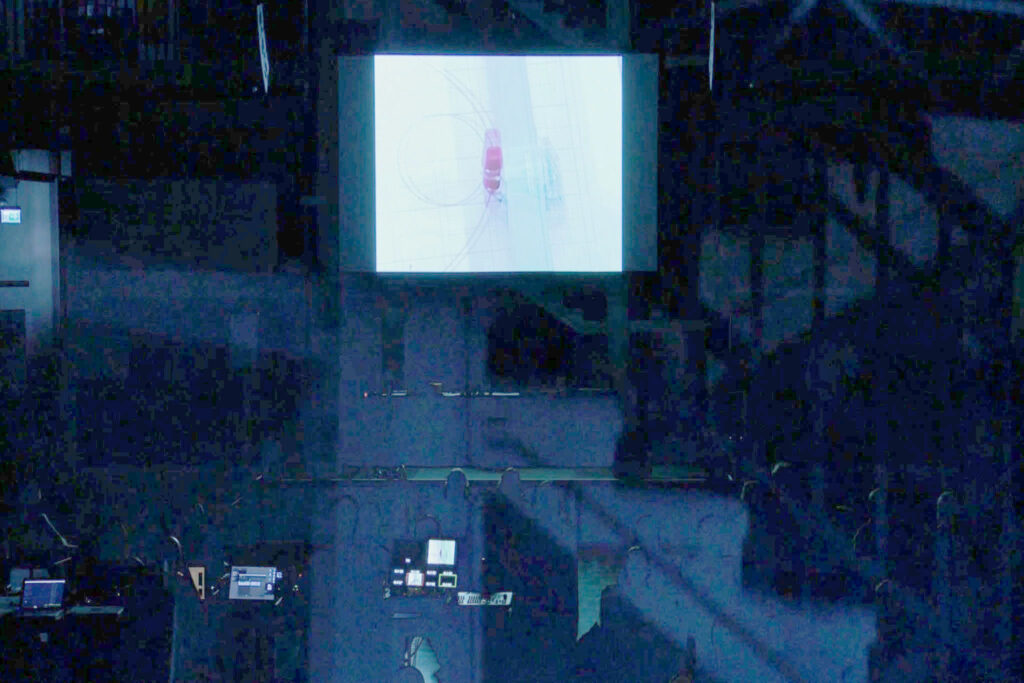
Karlsruhe University of Arts and Design (HFG)
Karlsruhe University of Arts and Design is a German college founded in 1992 by Professor Heinrich Klotz, who also founded its sister institution, the Center for Art and Media (ZKM). The teaching programe and research focus on new media and media art.
The German Council of Science and Humanities certified the HfG’s educational approach as „excellent“ in spring 2008.
The School encourages an interdisciplinary approach.
The 3D lab „Expanded 3 Digital Cinema Laboratory“, for example, focuses on 3D television and cinema.
South African College of Music (SACM)
The University of Cape Town’s, music department is known internationally as the South African College of Music (SACM) and is considered to be the leading music school in South Africa.
SACM offers undergraduate and postgraduate degree and diploma programmes specialising in African and World Music, Jazz Studies, Composition, Classical Music, Opera, Music Technology and Musicology.
3. CALL FOR APPLICATIONS FOR STUDENTS OF HFG
Baden-Württemberg-Plus Programme „Intercultural Media and Music Practice“
The Baden-Württemberg-Plus Scholarship provides specific support to enable qualified students from the Karlsruhe University of Arts and Design (HfG) to study at the South African College of Music (SACM) of the University of Capetown, South Africa for up to six month.
Planned exchange period is until Nov. 30th 2025.
Amount of Grant
Successful applicants will receive a stipend of 1150€ per month for up to five months.
Who Can Apply
Under- and postgraduate students from the Karlsruhe University of Arts and Design (HFG)
Eligibility Criteria
Successful Applicants should have a good academic record and academic performance and good to very good skills in the fields of sound design and multichannel audio. Cross cultural competence and good English language skills are required.
Application Procedure
Successful applicants are requested to submit:
- Tabular CV and information pertaining to ongoing artistic activities
- Proof of enrollment at HFG or equivalent
- Statement to participate in the Baden-Württemberg-Plus Programme „Intercultural Media and Music Practice“
- Letter of Motivation with a detailed creative project outline and brief description of the study objective at the host university (max 1 DIN A4 page)
- Folder or online portfolio with work samples/documentation showing the technical and aesthetic qualification in the desired areas
- Letter of recommendation from a supervising professor or staff member
- Equivalent grade point average (GPA) of at least 65% on the UCT grade scale
- Intermediate examination (everage grade good to very good) or equivalent artistic skills
- Proof of required foreign language skills (very good English skills)
- Possible travel periods (earliest, favoured, latest)
Requested documents should be sent via E-Mail (attention ‘Application to BWS-Plus 2025’) to immp@hfg-karlsruhe.de until May 18th 2025.
An independent committee will decide which applications to forward to the Baden-Württemberg State Plus Foundation for the approval of the successful applications.
There is no legal entitlement to grants.
Only completely filled in applications will be accepted.
Further information on: inside-sonic.de
Contact: immp@hfg-karlsruhe.de
3. CALL FOR APPLICATIONS FOR STUDENTS OF SACM/UCT
Baden-Württemberg-Plus Programme „Intercultural Media and Music Practice“
The Baden-Württemberg-Plus Scholarship provides specific support to enable qualified students from the South African College of Music (SACM) of the University of Cape Town, South Africa, to study at the MK-Sound department of Karlsruhe University of Arts and Design (HfG), Germany.
Planned exchange period is until Nov. 30th 2025.
Amount of Grant
Successful applicants will receive a stipend of 1150€ per month for up to five months.
Who Can Apply
Under- and postgraduate students from the South African College of Music (SACM) of the University of Cape Town (UCT)
Eligibility Criteria
Successful Applicants should have a good academic record and academic performance and good to
very good skills in the fields of sound design and multichannel audio. Cross cultural and interdisciplinary competence as well as good English language skills are required.
Application Procedure
Successful applicants are requested to submit:
- Tabular CV and information pertaining to ongoing artistic activities
- Proof of enrollment at UCT or equivalent
- Statement to participate in the Baden-Württemberg-Plus Programme „Intercultural Media and Music Practice“
- Letter of Motivation with a detailed creative project outline and brief description of the study objective at the host university (max 1 DIN A4 page)
- Folder or online portfolio with work samples/documentation showing the technical and aesthetic qualification in the desired areas
- Letter of recommendation from a supervising professor or staff member
- Equivalent grade point average (GPA) of at least 65% on the UCT grade scale
- Proof of required foreign language skills (very good English skills)
- Possible travel periods (earliest, favoured, latest)
Requested documents should be sent via E-Mail (attention ‘Application to BWS-Plus 2025-UCT’) to immp@hfg-karlsruhe.de until May 18th 2025.
An independent committee will decide which applications to forward to the Baden-Württemberg State Plus Foundation for the approval of the successful applications.
There is no legal entitlement to grants.
Only completely filled in applications will be accepted.
Further information on: inside-sonic.de
Contact: immp@hfg-karlsruhe.de
Contact
- Dr. Paul Modler
- Lorenzstr. 15
- Staatl. Hochschule für Gestaltung
- 76135 Karlsruhe
- Telephone // +49-(0)721-8203-2308
- immp@hfg-karlsruhe.de
- Lorenz Schwarz
- Lorenzstr. 15
- Staatl. Hochschule für Gestaltung
- 76135 Karlsruhe
- Theo Herbst
- University of Cape Town
- South African Collage of Music
- Private Bag
- Rondebosch 7701
- Republic of South Africa
Copyright
Our web pages and their contents are subject to German copyright law. Unless expressly permitted by law (§ 44a et seq. of the copyright law), every form of utilizing, reproducing or processing works subject to copyright protection on our web pages requires the prior consent of the respective owner of the rights. Individual reproductions of a work are allowed only for private use, so must not serve either directly or indirectly for earnings. Unauthorized utilization of copyrighted works is punishable (§ 106 of the copyright law).
